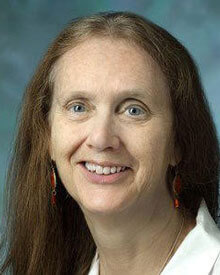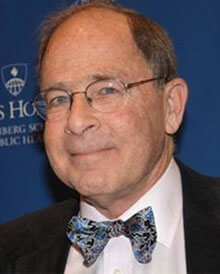Our Members
Robert Adams, D.V.M.
- Associate Professor of Molecular and Comparative Pathobiology
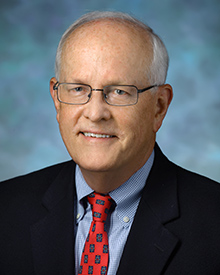
N. Franklin Adkinson, M.D.
- Professor of Medicine, Allergy-Immunology
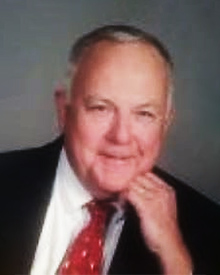
Mike Amey, B.A., M.A.S.
- Retired Senior Associate Dean for Research Affairs and Executive Director of Research Administration, Johns Hopkins School of Medicine
Professional profile: Michael (Mike) Amey, BA and MAS degrees from Johns Hopkins, retired as Sr. Associate Dean Research Affairs at the Johns Hopkins University School of Medicine, and Executive Director of Research Administration, Johns Hopkins Medicine, on January 1, 2020. He was in his 45th year at the School of Medicine and had been directing Research Administration here for 40 years.
During his tenure directing Research Administration, the School of Medicine's annual sponsored awards have grown from $90 Million to over $1 Billion.
Mike has lectured, advised and taught about research administration, sponsored funding, research compliance, facilities and administrative cost principles, research administration systems, research resources, clinical trials, and research career development. A past member, of the Board of the Council On Government Relations (COGR), and its Costing and Research Compliance committees, he intends, through the Academy, to remain active in COGR and to volunteer for faculty and research administration staff career development activities.
Personal profile: Mike’s wife, Betsy is a retired clinical social worker psychotherapist, his daughter Kate is an Assistant Professor in Developmental Psychology at Catholic University and his son John is a SOM Budget Officer. In retirement Betsy and Mike plan to spend more time with their three grandchildren, travel alot and devote more time to sailing on their boat Escapade.
Jean Anderson, M.D.
- Professor, Gynecology and Obstetrics
- Director, Johns Hopkins HIV Women’s Health Program
- Director, Johns Hopkins Global Women’s Health Fellowship
- Johns Hopkins Medical Institutions
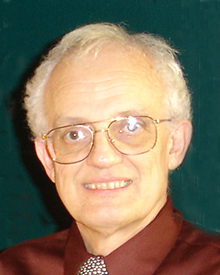
John E. Anderson, M.D.
- Assistant Professor, Division of Nephrology
Professional profile: A graduate of the College of the Holy Cross and the Johns Hopkins University School of Medicine, John Anderson received his medical training at Johns Hopkins Bayview Medical Center and fellowship training at the University of Kentucky Medical Center.
After a brief stint in private practice, Anderson spent nearly all of his career as a clinical nephrologist at Johns Hopkins Bayview, where he did home peritoneal dialysis, geriatric peritoneal dialysis, and started and ran the home hemodialysis program. His research interests were dialysis in the elderly, physical function of dialysis patients and epidemiology of chronic kidney disease.
Anderson served as chief of nephrology at Medstar Franklin Square Hospital during the Division of Nephrology’s affiliation with that hospital. He has been on the Medical Advisory Committee for the local chapter of the National Kidney Foundation.
At age 60, Anderson had an episode of unstable angina that required a three-vessel coronary artery bypass graft at Johns Hopkins. The surgery and rehabilitation were a success, but coping with work stress led him to retire early.
Personal profile: I am married to Cheng J. Cao, a retired research scientist. Our one child, Shen, is a corporate banker in London, where we spend three months a year with our two grandchildren. Our home is on 4 acres of fruit trees and grass in Glen Arm, Maryland. I am a docent, write for and edit the newsletter, and serve on the board of directors of the National Capital Radio and Television Museum in Bowie. I play golf with my wife, a hobby she calls “green opium.”
Academy interests: social activities, coordinating speakers and talks

Lawrence Appel, M.D., M.P.H.
- Professor of Medicine, Genetic Medicine
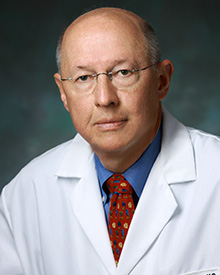
Ernest Arnett, M.D.
- Assistant Professor of Medicine, Cardiology
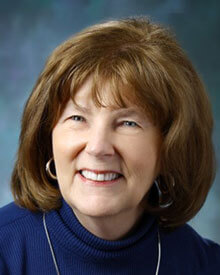
Nancy Ator, Ph.D.
-
Professor of Psychiatry & Behavioral Sciences, Behavioral Biology
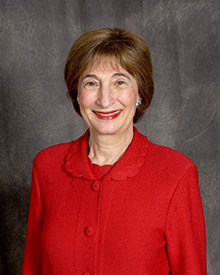
Marion J. Ball, Ed.D.
- Professor Emerita, Johns Hopkins University School of Nursing
- Affiliate Professor, Division of Health Sciences Informatics, Johns Hopkins University School of Medicine
- Currently Senior Advisor, Healthcare Informatics, Center for Computational Health IBM
- Research, IBM Industry Academy Member
Professional profile: Marion Ball received her bachelor’s and master’s degrees in mathematics from the University of Kentucky and her doctorate in medical education from Temple University in Philadelphia. She has held positions at the University of Kentucky, Temple University, was vice president for Information Services at the University of Maryland and professor for nursing informatics at The Johns Hopkins University. After retiring from Johns Hopkins, she accepted a position with IBM Corporation as a senior adviser in research.
She is a member of the National Academy of Medicine and a fellow in the following organizations: American College of Medical Informatics (ACMI), American Health Information Management Association, Medical Library Association, College of Health Information Management Executives, Health Information Management Systems Society (HIMSS), and American Academy of Nursing. In 2017, she was elected as a fellow in the International Academy for Health Sciences Informatics.
She received the Morris F. Collen Lifetime Achievement Award from ACMI/AMIA, and in 2017 was recognized by the HIMSS as one of The Most Influential Women in Health IT. In addition, in 2017 she was honored by Health Data Management as one of The Most Powerful Women in Healthcare IT.
She is the author/editor of over 25 books and over 225 articles in the field of health care informatics. Several books have been translated into German, Chinese, Korean, Polish and Spanish. Her research interests are in nursing informatics, point-of-care enabling technologies, precision medicine and adherence issues, as well as a curricular initiative called Technology Informatics Guiding Education Reform (TIGER).
Personal profile: I am recently widowed. I was married for 58 years to John C. Ball, professor of medical sociology with expertise in drug abuse issues. We have two accomplished children, Charles J. Ball, deputy assistant secretary of defense for threat reduction and arms control in the Pentagon, and a daughter, Elizabeth Ball Concordia, president and chief executive officer, University of Colorado Health Care System. I have five grandchildren.
Academy interests: serving on the Academy social committee, mentoring in my field
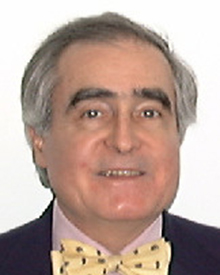
Edward L. Bartlett Jr., M.D., M.B.A., F.A.A.P.
- Assistant Professor, Part-Time, Pediatrics/Neonatology (Emeritus)
Professional profile: Edward Bartlett joined Johns Hopkins as a neonatologist and assistant director of nurseries in 1983 at what is now Johns Hopkins Bayview Medical Center. Then, as a pediatrician, he joined Wyman Park Medical Associates, which became Johns Hopkins Community Physicians (JHCP). He remains on the Pediatric Practice Standards Committee at JHCP. In addition to 45 years of training and practice in pediatrics/neonatology, he taught students and residents as an attending physician for 38 of those years. He has been a member of an institutional review board or research committee and chaired an IRB for most of the last 40 years. He also has a small bibliography of pediatric and neonatal publications and presentations. He continues a commitment to the Maryland chapter of the American Academy of Pediatrics as a breastfeeding coordinator (board adviser) and is now on the board of the Maryland Breastfeeding Coalition, which he joined when it was a committee in the mid-1980s. His ongoing interests are breastfeeding in the workplace and feeding protocols for premature infants in the neonatal intensive care unit.
A graduate of College of the Holy Cross and Northwestern University (now Feinberg) Medical School, Bartlett trained at St. Christopher’s Hospital for Children and Temple University hospitals as well as St. Louis Children’s Hospital, Washington University. He was assistant director of NICU at Medical College of Pennsylvania and neonatologist (first and only in Montgomery County in 1980) as director of nurseries at Holy Cross Hospital, Silver Spring, Maryland.
Personal profile: I was an active runner and soccer player for 50 years, and now walk and swim. I am married to a special education teacher and have two children, who teach art and French at university level.
Academy interests: I currently teach in the Longitudinal Ambulatory Clerkship (first- and second-year medical students), for which I did clinical practice teaching since its inception in 2009. I also teach in the pre-clerkship education exercises (PRECEDE) for the third-year student pediatric clerkship. I will be helping the Academy by coordinating speakers and talks, and I plan to continue the post-retirement activities listed above.
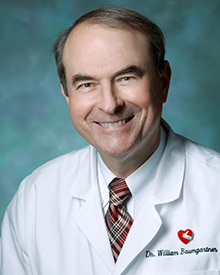
William A. Baumgartner, M.D.
- Inaugural Chair, The Academy at Johns Hopkins, East Baltimore Campus
- Professor Emeritus, Surgery
- Distinguished Service Professor
Professional profile: William A. Baumgartner joined Johns Hopkins’ Cardiac Surgery Division in 1982. The following year he reinitiated the heart transplant program at The Johns Hopkins Hospital, which has grown into one of the leading centers in the surgical treatment of heart failure in the country. For 17 years, he led the division as the cardiac surgeon-in-charge. Today he serves as the inaugural chair of the Academy at Johns Hopkins, East Baltimore campus. Past president of the Society of Thoracic Surgeons (STS) and the International Society of Heart and Lung Transplantation, Baumgartner has held top posts in several other national and international professional organizations, including executive director of the American Board of Thoracic Surgery.
His research laboratory began investigating neurological protection in cardiac surgery, which resulted in continuous NIH support for over 25 years. In 2002, he received the Javits Neuroscience Research Investigator Award from the NIH. In 2003 and 2009, he received the Socrates Teacher of the Year Award from the Thoracic Surgery Residents Association. In 2007, he received the Distinguished Alumnus Award from the University of Kentucky Medical Alumni Association, and the STS presented him with the Earl Bakken Scientific Research Award in 2008. In 2009, he received the Heritage Award from the Johns Hopkins University Alumni Association. In 2015, he received the Distinguished Service Award from the STS.
Baumgartner was the vice dean for clinical affairs and president of the Clinical Practice Association of The Johns Hopkins University from 1999–2018. He served as the inaugural Johns Hopkins Medicine senior vice president for the Office of Johns Hopkins Physicians from 2011–2018.
A graduate of Xavier University and of the University of Kentucky Medical School, Baumgartner received his surgical training at Stanford University Medical Center. His bibliography includes more than 400 journal articles, book chapters and books.
Personal profile: I am married to Betsy Baumgartner, a retired Bryn Mawr Lower School reading specialist, and have three accomplished children: Bill Jr., a Ph.D. in bioinformatics at University of Colorado; Amy, a pediatrician in a Children’s Hospital of Philadelphia practice; and Mark, associate director of engineering and energy at The Johns Hopkins University; as well as seven wonderful grandchildren. Betsy and I are Florida residents living on Sanibel Island for over half the year, co-editing an electronic textbook of adult and congenital cardiac surgery, drafting an autobiography of 49 years of marriage for our children and attempting to lower my golf handicap!
Academy interests: mentoring junior faculty and medical students, teaching cardiac surgery residents and fellows
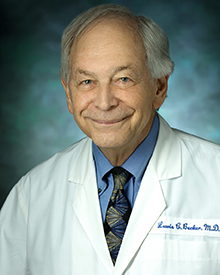
Lewis C. Becker, M.D.
- Professor Emeritus, Cardiology
Professional profile: Lewis Becker joined the cardiology faculty in 1974 as director of the coronary care unit. He was a pioneer in the development of nuclear myocardial perfusion imaging and was the director of the Nuclear Cardiology Clinical and Training Program from 1980 to 2018. He directed the Cardiology Fellowship Selection Program until 2005 and served as the co-chair of the Johns Hopkins Institutional Review Board. He was principal investigator of the Johns Hopkins Specialized Center for Ischemic Heart Disease Research and a subsequent program project on ischemic and reperfusion injury of the heart. For the past 20 years, he has collaborated on the study of mechanisms of familial coronary disease, GeneSTAR (Genetic Studies of Atherosclerosis Risk), and has held a number of NIH grants on the genetic determinants of platelet function and related multiomics. He remains as principal investigator on a National Heart, Lung, and Blood Institute study of clonal hematopoiesis in families with coronary disease history.
Becker is a 1966 graduate of the Johns Hopkins University School of Medicine, completed his internship and residency at Massachusetts General Hospital, and cardiology fellowship at Johns Hopkins and The Royal Postgraduate School of Medicine at the Hammersmith Hospital in London. Becker held the Robert L. Levy Chair in the Division of Cardiology until retirement.
Personal profile: I am married to Diane Becker (professor emerita, medicine). Our daughter, Kirsten, is director of the Survey Research Group at the Rand Corporation in Santa Monica, California. We reside in Baltimore and are seasonal residents of Martha’s Vineyard and Los Angeles.
Academy interests: mentoring, collaborative research, education
Stan Becker, Ph.D.
- Professor of Population, Family and Reproductive Health
- Bloomberg School of Public Health
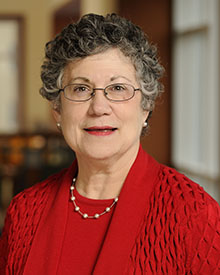
Anne Elizabeth Belcher, Ph.D., R.N., A.N.E.F., F.A.A.N.
- Associate Professor (retired), Johns Hopkins University School of Nursing
- Associate Professor (clinical), Johns Hopkins University School of Education
- Associate Professor (joint appointment), Sidney Kimmel Comprehensive Cancer Center
Professional profile: Anne Belcher has 50 years of experience in nursing education, having taught at the baccalaureate, masters and doctoral levels. She has held numerous administrative and educator positions throughout her career. Belcher’s area of expertise is oncology nursing and her research interest is psychosocial aspects of cancer, with a focus on spiritual care.
Belcher holds a bachelor’s degree in nursing from the University of North Carolina (where she was inducted into Sigma Theta Tau International), a master’s degree in nursing from the University of Washington, and a doctorate from Florida State University. She is a fellow in the American Academy of Nursing and a fellow in the Academy of Nursing Education.
Her current endeavors include serving as faculty in the Master of Education in the Health Professions program in the Johns Hopkins University School of Education, where she teaches online courses in curriculum development and evidence-based teaching. She also advises fellows on their capstone projects.
At Johns Hopkins Kimmel Cancer Center, she serves as project director for the Flynn Fellows Program, which awards stipends to two baccalaureate students each summer for a precepted immersive experience in oncology nursing. The students are selected from applicants from several bachelor of science programs in the state of Maryland.
Belcher is a peer reviewer for the following professional journals: Nurse Educator, Journal of Nursing Education, American Journal of Nursing and Ostomy Wound Management.
She enjoys consulting with schools of nursing on local and national levels with regard to such issues as preparation for accreditation, curriculum review and revision, review of promotion and tenure criteria, and enhancement of quality improvement in DNP curricula.
Personal profile: I have a domestic partner and a black Labrador retriever and live in the Butchers Hill neighborhood of Baltimore City. I enjoy traveling, reading and attending live theater and storytelling festivals.
Academy interests: I am interested in mentoring students with regard to all aspects of the faculty role, with an emphasis on teaching, curriculum development and evaluation, focusing on peer review of teaching.

Ivor Berkowitz, M.D.
-
Professor of Anesthesiology & Critical Care Medicine, Pediatric Anesthesiology & Critical Care Medicine

Joann Bodurtha, M.D., M.P.H.
-
Professor of Genetic Medicine

Michael Borowitz, M.D.
-
Professor of Pathology, Hematology
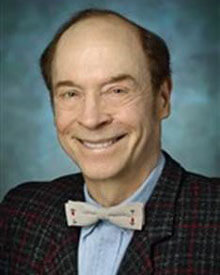
James Brasic, M.D., M.P.H.
-
Assistant Professor of Neuroscience
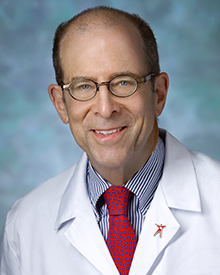
Joel Brenner, M.D.
- Associate Professor of Pediatrics, Cardiology
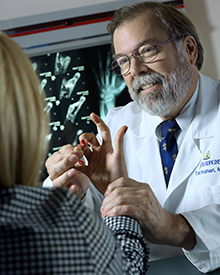
Thomas Brushart, M.D.
- Professor of Orthopaedics, Hand Surgery
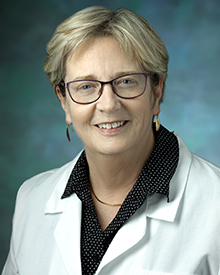
Arlene M. Butz, Sc.D., C.R.N.P.
- Professor of Pediatrics
Professional profile: Arlene M. Butz joined the Johns Hopkins University School of Nursing as faculty in 1989 and the school of medicine, Division of General Pediatrics and Adolescent Medicine in 1998. Butz is a nurse-scientist who also practices as a pediatric nurse practitioner. Her research began in 1989–2000 when she was co-principal investigator of the grant creating the pediatric HIV clinic at the Johns Hopkins Harriet Lane Clinic (intensive primary care), followed by a behavioral home-based study of in utero drug exposed infants. After working with senior asthma researchers at Johns Hopkins and Howard University, she received funding in 2001 investigating home-based interventions for inner city children with asthma. Butz has been continuously funded over the past 18 years. In 1989, she received the Loretta C. Ford Award for excellence in research as a nurse practitioner, and in 2005 the Pennsylvania State University School of Nursing Alumni Award. In 2013, she received the American Thoracic Society Nursing Assembly Marilyn Hansen Award.
Butz is a graduate of the Pennsylvania State University School of Nursing and she received a doctor of science degree from the Johns Hopkins Bloomberg School of Public Health. Her bibliography includes more than 150 journal articles and book chapters. She continues to assist junior faculty with clinical research projects in public housing units.
Personal profile: I am married to Michael F. Murphy, a retired architect, and have one stepson, two grandchildren and one accomplished cat. Michael and I live in northern Baltimore County near the NCR trail, which we use for biking and hiking. My hobbies include watercolor and acrylic painting, yoga and volunteering at First Fruits Farm and Animal Rescue, Inc.
Academy interests: mentoring junior faculty, reviewing manuscripts and volunteering
James N. Campbell, M.D.
- Professor Emeritus of Neurosurgery
- Director of the Blaustein Endowment for Pain Research and Education
- President and Chief Scientific Officer of Centrexion Therapeutics Corporation
Professional profile: One of James Campbell’s life missions is to improve treatments for chronic pain. By training, he is a neurosurgeon, now professor emeritus of neurosurgery at Johns Hopkins. During his clinical practice years, he developed peripheral nerve surgery as a new subdivision in the Department of Neurosurgery. He also had a general practice in spine surgery. One of his particular interests was treating patients with severe chronic pain. Campbell also directed a pain research laboratory and received 31 years of uninterrupted NIH support for neuroscientific research, largely directed at understanding the mechanisms of neuropathic pain. This research work has been recognized by several national awards, including the NINDS Jacob Javits Neuroscience Investigator Award. His published work has been highly cited and led to over 100 peer-reviewed publications. In 1996, he served as president of the American Pain Society.
For the past 14 years, Campbell has been directly involved in drug development, with multiple patents and patent applications. He was co-founder of Amplimmune (PD1 immunotherapeutics; acquired by AstraZeneca) and CNS Therapeutics (acquired by Covidien). He is highly experienced in drug development from preclinical research through drug approval. One of the founders of Centrexion Therapeutics, he serves as president and chief scientific officer. Centrexion was founded in 2013 with the sole mission of developing new treatments for chronic pain. Centrexion’s leading pipeline candidate is a potential new therapeutic for osteoarthritis pain and is in Phase III clinical trials. Campbell played an integral role in this program from discovery (initial patents) through present clinical trials. Centrexion has a pipeline of other drugs for treatment of neuropathic pain, and Campbell has played an integral role in the preclinical and clinical studies with each of these programs.
Campbell continues to be active in the Johns Hopkins community, and is director of the Blaustein Pain Research and Education Endowment, which sponsors a weekly conference, grants program and annual award for pain research. He also serves as a mentor-in-residence with Johns Hopkins Technology Ventures.
Personal profile: My wife of 37 years is Regina Anderson, who has a full-time private dermatology practice based in Baltimore. Ashley Campbell, our daughter, is assistant professor of oculoplastic surgery at Johns Hopkins. Our son, Colin Campbell, is graduating from the Wharton School of Business and will be taking a position as consultant with Bain and Company in New York. I play squash at the Maryland Club and New York Athletic Club, golf at the Elkridge Club, and play classical piano as well. Regina and I also have a home in New York City and travel the world (sometimes on a bike).
Academy interests: My academic interests are in drug development, lecturing, teaching, entrepreneurship and giving back to Johns Hopkins for the privilege of serving on faculty for 30-plus years.
Srinivasan Chandrasegaran, Ph.D.
- Professor, Environmental Health and Engineering
- Bloomberg School of Public Health
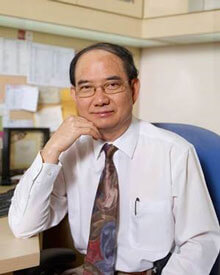
Alex Chang, M.D.
- Professor of Medicine, Oncology
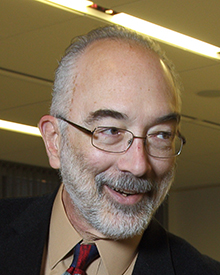
Alan Coltri, M.S.
- Assistant Professor of Health Sciences Informatics
Professional profile: Mr. Coltri graduated from the California Institute of Technology (Caltech) with a bachelor’s degree in Engineering and Applied Science in 1974. He came to Johns Hopkins in 1990 as an information technology project leader, after having previously served as a mechanical design engineer in the Advanced Engine Division of Ford Motor, and as a Weapons Test Engineer with the rank of Captain in the US Air Force’s Systems Command. While in the Air Force Mr. Coltri obtained an master’s degree in “Program Evaluation and Organizational Assessment.” In the early 1990s he designed the Johns Hopkins Electronic Patient Record (EPR) system. Initially deployed in 1995, EPR was the backbone of the Johns Hopkins clinical application suite for nearly twenty years. By 1996 Mr. Coltri had been promoted to the position of Chief Systems Architect at the Johns Hopkins Hospital, a position he retained until his retirement in 2019.
Other major projects have included: the implementation of Johns Hopkins first digital system integration projects based upon the international HL7 standard; the reconciliation and merger of the patient records from all Johns Hopkins mid-Atlantic hospitals and outpatient facilities; and the design and construction of the first generation Precision Medicine Analytic Platform (PMAP) supporting enterprise scale big data analytics. System integration projects have been a constant theme of Mr. Coltri’s career, growing to encompass the entire Johns Hopkins enterprise, with over 200 diverse medical system exchanging data in real-time.
Personal profile: My wife Laurie and I grew up in Los Angeles California and came to Maryland during the Cold War when I was serving in the Air Force. Both of our daughters, Julia and Robin, were born in Baltimore. We now live in Columbia where Laurie and I are avid members of our church choir, singing alto and bass. We currently occupy ourselves with community service through our church and enjoy occasional European travel.
Academy interests: local politics, economics, and studying and teaching current events and social change. I am also involved in a variety of community service projects on a local level.
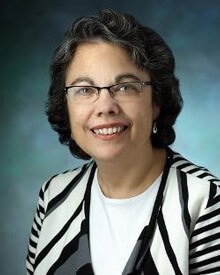
Catherine Cordero-Parrish, M.D.
- Retired Sr. Pediatrician Johns Hopkins Community Physicians (JHCP)
- Part-time Faculty Dept. of Pediatrics
Professional profile: A native of New York City, Catherine attended Queens college, and then did her medical training as a Morehead Fellow in medicine at the University of North Carolina in Chapel Hill. Internship and residency were completed at Children’s National Medical Center in D.C. where she developed a keen interest in primary care pediatrics. In 1986 Catherine began her practice career at the new Johns Hopkins Health Plan (1986-’90). After a brief stint in private practice (’90 -‘92),Catherine returned to Wyman Park Medical Associates and spent the next 30 years practicing pediatrics as part of the Johns Hopkins family. Over that time, she was a continuity clinic preceptor for pediatric residents, a participant in the longitudinal clerkship for medical students and hosted numerous residents for community electives in primary care.
In 2016 Catherine was honored to be one of the inaugural inductees in the JHCP Clinical Academy of Excellence. She has served as an active member of this academy leading efforts to mentor young colleagues throughout JHCP.
Catherine’s academic and research interest has focused on concussion management and prognosis. She has done system-wide education for her colleagues on diagnosis and management, as well as participating in research with Kennedy Krieger Institute faculty.
Personal profile: I am an avid hiker and biker. I love to travel and am interested in travelling to more of our National Parks. I am a member of my church choir and love theater and music. I am also a crossword puzzle enthusiast and have participated in the American Crossword Puzzle Tournament.
I am a widow and mother of four children: Sarah- ESL teacher; Abbey - artist and curator; Mitchell – physical therapist, and Russell - port captain.
Academy Interests: I am interested in doing community volunteer work, as well as volunteering as a community voice in the Harriet Lane Clinic at Hopkins.
I would be happy to mentor colleagues in primary care, and in fact have an ongoing project in that area with Johns Hopkins Community physicians.
I am also looking forward to engaging with other retirees in social functions.
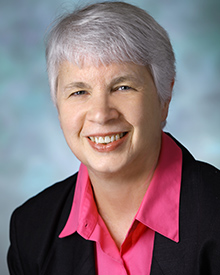
Virginia L. Corson, M.S., C.G.C.
- Genetic Counselor
- Associate Professor, Gynecology & Obstetrics and Institute for Genetic Medicine (retired)
Professional profile: Virginia “Ginny” Corson came to The Johns Hopkins Hospital in 1975 as its first genetic counselor. She worked for three years in the Pediatric Genetics Clinic and then moved to the Prenatal Diagnostic Center in the Department of Gynecology & Obstetrics, where she remained until her retirement in 2018. A past president of the National Society of Genetic Counselors (NSGC) and the American Board of Genetic Counseling, she has served in various other roles in both of those organizations. She also served one term on the board of directors of the American Society of Human Genetics. In retirement, she is remaining active with NSGC by serving as co-chair of its Late Career Special Interest Group. Corson received the Natalie Weissberger Paul National Achievement Award in 1997 from the NSGC and the Mildred Hairston Service Excellence Award in 2006 from the Department of Gynecology & Obstetrics. Her clinical role in the Division of Maternal-Fetal Medicine focused on providing genetic counseling services to patients at increased risk to have a child with a genetic disorder or birth defect. In addition, Corson was involved with the training of genetic counseling students, maternal-fetal medicine fellows and Institute of Genetic Medicine residents. She was a co-author on a variety of case reports and clinical studies.
Corson received her bachelor’s degree in biology from Princeton University and her master’s degree in human genetics from Sarah Lawrence College.
Personal profile: I am married to Dennis Headings, a retired pediatrician. We live in Baltimore and enjoy visiting family and friends, as well as attending alumni events at Princeton and Penn State. My interests include singing in a church choir, attending Center Stage, participating in activities at HopeWell Cancer Support and cheering for the Orioles. In retirement, I have also been learning to play canasta, attending an exercise class, writing several sections for a genetics book, going to Odyssey lectures and lunching with friends. I am also looking forward to adding a volunteer activity to my schedule.
Academy interests: community service activities, speakers
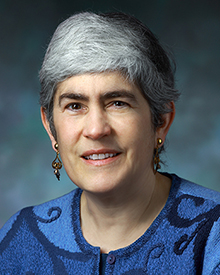
Jane Crosson, M.D.
- Associate Professor of Pediatrics
Deborah Dang, Ph.D.
-
Sr. Director of Nursing
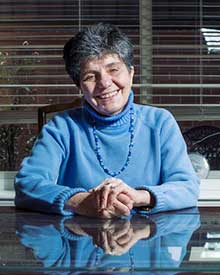
Catherine DeAngelis, M.D., M.P.H.
- University Distinguished Service Professor, Emerita, Johns Hopkins University School of Medicine and School of Public Health
- Additional Titles: Editor-in-Chief Emerita, JAMA
Professional profile: Catherine DeAngelis received her medical degree from the University of Pittsburgh’s School of Medicine, her master of public health degree from the Harvard Graduate School of Public Health and her pediatric specialty training at The Johns Hopkins Hospital. She has been awarded seven honorary doctorate degrees and has received numerous awards for humanitarianism and medical excellence, including the Ronald McDonald Award for Medical Excellence ($100,000 donation made to the Johns Hopkins Child Life Program); the Catcher in the Rye Award for Humanitarianism by the American Academy of Child and Adolescent Psychiatry; the Armstrong, the St. Geme, and the Howland Award from various pediatric societies; and a lifetime achievement award by the Association of American Medical Colleges.
She has authored or edited 13 books on pediatrics, medical education and patient care, professionalism and her recently published memoir, Pursuing Equity in Medicine: One Woman’s Journey. She has published over 250 peer-reviewed articles, chapters and editorials. Most of her recent publications have focused on professionalism and integrity in medicine, conflict of interest in medicine, women in medicine, and medical education. Her major efforts have centered on human rights.
DeAngelis is a member of the National Academy of Medicine, a fellow of the American Association for the Advancement of Science; a fellow of the Royal College of Physicians (UK) and has served as an officer of numerous national academic societies. She currently serves on the advisory board of the U.S. Government Accountability Office, and serves on the board of trustees of the University of Pittsburgh and Wake Forest Medical School and Medical Center.
Personal profile: I am married to James Harris, Johns Hopkins professor of psychiatry, pediatrics, mental health and history of medicine. We have no birth children, but we are very close to our seven nieces and nephews and 15 grandnieces and grandnephews. He and I are consultants to the Myanmar (Burmese) minister of health to revise the medical curriculum for their five public medical schools and to upgrade the psychiatric education and services in Myanmar. We have traveled to the seven continents. In addition, I have worked in a bush hospital in Liberia, a barrio in Peru and delivered immunizations in Nicaragua. I love to read, especially mysteries; walk in woods, especially near our house on the Delaware River in northeastern Pennsylvania; and watch movies.
Academy interests: I am interested in personal mentoring, teaching and helping young faculty and fellows get their papers published.
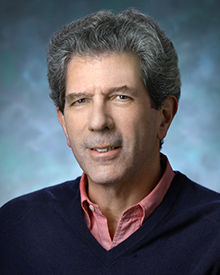
Stephen Desiderio, M.D., Ph.D.
- Professor of Medicine, Molecular Biology/Genetics & Medicine
Barbara Detrick, Ph.D.
- Professor of Pathology, Immunology
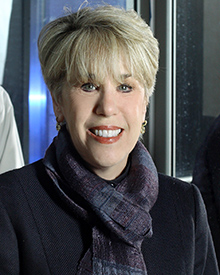
Amy Deutschendorf, M.S., R.N.
- Adjunct Faculty Johns Hopkins School of Nursing
- Principal, Clinical Resource Consultants, LLC
Professional profile: Amy Deutschendorf recently retired as the vice president of care coordination and clinical resource management for the Johns Hopkins Hospital and Health System after a 20-year relationship with the health system as both a consultant and staff member. Amy led the Johns Hopkins Health System initiative on reducing preventable readmissions and spearheaded the adoption of expansive care coordination and transitions of care “bundle of strategies” to improve patient outcomes.
Amy and her team helped write and implement a $19.5 million federal innovation grant that launched the Johns Hopkins Community Health Partnership and resulted in over $90 million in acute care savings for Medicare and Medicaid programs. Amy created the Johns Hopkins Medicine Patient and Family Education Steering Committee to improve patient education and health literacy across all care settings. Under her leadership, the hospital also launched the Johns Hopkins After Care Clinic and the Patient Access Line, both of which serve recently discharged patients to ensure their success for self-care management.
Amy has over 40 years of administration, nursing practice, education and development, and consulting experience, focused on advanced nursing practice, care delivery transformation, leadership development, health policy and regulatory compliance. She has provided clinical, management and strategic consultation services nationally to academic medical institutions and has developed and implemented novel, innovative strategies for patient care models to improve quality and safety outcomes. She has published and presented nationally on topics affecting patient outcomes, including readmission risk-reduction strategies, professional nursing advancement, patient care delivery and current health care trends. She holds a master’s degree in nursing from the University of Maryland, and a bachelor’s degree in nursing from Case Western Reserve University.
Personal profile: I am married to Ira T. Fine, an accomplished internist and rheumatologist, and Johns Hopkins Hospital board member. We have six children (12 including spouses) and 13 grandchildren ranging from 2 to 14 years old. I continue to be a fierce patient and consumer advocate and health policy watchdog (particularly related to the Maryland Waiver and its impact on consumers), in addition to activities around population health improvement in East Baltimore. I like to paint, cook and play the guitar.
Academy interests: Mentoring and coaching nursing students, graduates and emerging health care leaders. Teaching about patient- and family-centered care delivery, health policy, population health improvement and effective leadership skills. Community volunteering and however else my skill set may be useful!
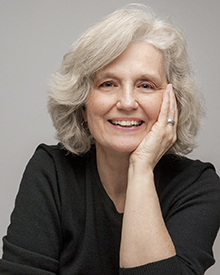
Kay Dickersin, M.A., Ph.D.
- Professor Emeritus of Epidemiology
Professional profile: Kay Dickersin, M.A., Ph.D., is Professor Emeritus of Epidemiology at the Johns Hopkins Bloomberg School of Public Health.
She served as the Director for the Center for Clinical Trials and Evidence Synthesis in the Department. She was also Director of the U.S. Cochrane Center.
Kay’s main research contributions were in the area of scientific integrity, reporting biases, trials registration, clinical trials, systematic reviews and meta-analysis, and the development and utilization of methods for the evaluation of health care interventions and their effectiveness. Kay’s research included comparing internal company documents to the published record for scientific research; she found conflicting results. Her work also included education and building capacity related to clinical trials and systematic reviews and consumer engagement in research. While at Hopkins, Kay was actively engaged in online and in-person teaching, including developing courses for both consumers and health professionals (e.g., on evidence-based healthcare, epidemiology, peer review, clinical trials and systematic reviews). Her research was funded by the National Institutes of Health, the Agency for Healthcare Research and Quality, and the Patient Centered Outcomes Research Institute (PCORI), and others.
Among her honors, Kay is an elected member of the National Academy of Medicine.
Kay received a Master’s degree in zoology, specializing in cell biology, from the University of California, Berkeley, and a Ph.D. in epidemiology from Johns Hopkins University's School of Hygiene and Public Health.
Personal profile: I retired from Johns Hopkins as of 2019. I loved my work! In my new life, I am reinventing myself. For example, I love expanding my knowledge about nonscience topics and the arts, and I want to contribute to Baltimore achieving its full potential. We have traveled extensively and will continue to do so as long as we are able. I am married to Robert Van Wesep and have 2 sons and 3 grandchildren.
Academy interests: social activities, community volunteering, speakers and talks.

Sharon P. Dlhosh, M.D., M.P.H., F.A.C.P.
- Assitant Professor of Medicine, General Internal Medicine
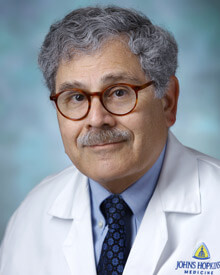
Mark Donowitz, M.D.
- Professor of Medicine and Physiology
Professional Profile: Med Sch: JHU; house staff: JHU, Einstein; GI fellowship Yale; Walter Reed Army Institute of Research. First job: Professor of Medicine, Tufts Un SOM and New England Medical Center At JHU since 1988 , came as Chair of Gastroenterology (decade), Director of NIH GI Core Center as research infrastructure for GIRese (20 years), PI GI T32 (30 years), recruited to bring modern cell biology and molecular biology to GI/Dept of Medicine and to promote diversity. Brought therapeutic endoscopy, liver transplant and recruited first women and African Americans to GI. Research: epithelial biology related to intestinal Na and Cl transport; cloned epithelial members of mammalian Na/H exchanger gene family (NHE2 and NHE3) and NHERF2, multi PDZ domain scaffold; structure-function studies; role in diarrhea and drug development to correct diarrhea related changes. Early use of human enteroids to understand GI physiology and pathophysiology. AFCR, ASCI, AAP, Fellow AAAS. President of American Gastroenterological Association, Gastrointestinal Research Group. NIH Council NIDDK, Dental Institute. Current: Sci Adv Boards: Vanderbilt Pediatric Diarrheal Disease Consortium and Dartmouth CF Center; Associate Editor Physiologic Reviews; Examiner for asylum, HEAL.
Personal Profile: Wife Jacqueline ney Marx, involved in Baltimore Foster child program, grants program Baltimore Women’s Giving Circle, synagogue Social Action Committee, leadership J Street Baltimore, devoted to the underserved, married 56 years; children Michael 53 (Broadridge Financial Solutions, with SEC to explain new investment instruments to Fidelity, Vanguard, Canadian Government, etc) , Paul 50 (human rights lawyer), grandchildren, Jacob 22 (started work in investment); Emma 20 rising junior; Clara 18 starting college ; Nora 8 a delight. Daughters in law, Tina retired teacher and Bobbie, Director of Earth Rights International (human rights group).
Academy Interests: for now, community volunteering
George Dover, M.D.
- Professor of Pediatrics
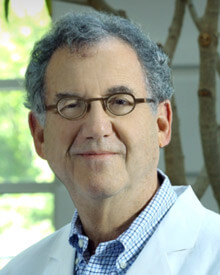
Mario Eisenberger, M.D.
- Professor of Oncology
- Dale Hughes Professor of Oncology and Urology
Professional profile: Dr. Mario A Eisenberger is the first recipient of the Dale Hughes Professorship of Oncology and Urology. Dr Eisenberger has spent a career of 45 years in clinical research involving genitourinary cancers with major focus on the development of new treatments for prostate cancer. Graduated in 1972 at the Federal University of Rio de Janeiro, Brazil, trained in Internal Medicine (Michael Reese Hospital and the University of Chicago) followed by a fellowship in Medical Oncology at the Comprehensive Cancer Center for the State of Florida and The University of Miami. Subsequent experience included a senior investigator position at the National Cancer Institute and faculty positions at the University of Miami and University of Maryland prior to moving to Johns Hopkins Hospital in 1993. Dr Eisenberger has published extensively with approximately 450 peer reviewed publications and multiple book chapters mostly in the field of prostate cancer, most notably clinical trials reporting the results of pivotal trials involving compounds that eventually became standard treatment for prostate cancer (leuprolide, flutamide and docetaxel). He served on multiple boards in the pharmaceutical industry, the World Health Organization, National Cancer Institute and the Food and Drug Administration. In the corporate world Dr Eisenberger is an independent director in the board of VERU Inc., a biopharmaceutical company focusing in Oncology and Infectious disease.
Personal profile: I am a native of Brazil (first generation) and the son of German Jewish immigrants with family in Brazil, USA, Sweden, Israel, Chile and the Netherlands (which I make sure to visit often); fluent in English, Portuguese, Spanish and German. I am a long-time enthusiastic cyclist and one of my main hobbies is to travel the world extensively.
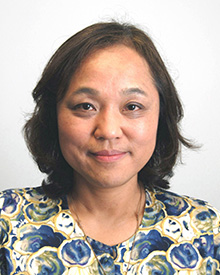
Noriko Esumi, M.D., Ph.D.
-
Assistant Professor of Ophthalmology
Professional profile: Dr. Esumi is an Assistant Professor of Ophthalmology at the Wilmer Eye Institute. She received her M.D. and Ph.D. degrees from Kyoto Prefectural University of Medicine in Kyoto, Japan. She completed her Pediatrics residency and a clinical fellowship in Pediatric Oncology at that same university. Thus, Dr. Esumi's early career and interests were in pediatric oncology. While she found treating children with cancer enormously rewarding, she became increasingly aware of the importance of basic research in understanding disease better and therefore treating patients more effectively. This experience led her to seek an opportunity to study basic science in the US. After working in the field of cancer biology as a postdoctoral fellow at the M.D. Anderson Cancer Center in Houston, Texas, Dr. Esumi wanted to learn molecular biology to dissect the pathogenic mechanisms of human diseases at the molecular level. She found such an opportunity in eye research at the National Eye Institute. Since then, Dr. Esumi's research interests have been in eye research. She joined the Wilmer faculty as a research associate in 1997. Her research focus has been on the regulation of gene expression in the retinal pigment epithelium (RPE), an essential cell type for supporting the health and function of retinal photoreceptor cells. The RPE is also important as the primary site of damage causing age-related macular degeneration (AMD). Therefore, her research focus has gradually shifted from basic molecular biology to understanding of the molecular process of eye diseases, particularly AMD.
Personal profile: As a child, I loved mystery books and wanted to be a detective. As an adult, I became a medical doctor but decided to be a scientist because I could be a detective investigating nature's mysteries. I loved my job, so spent a lot of time for performing experiments and interpreting their results. My love for science will stay forever. I also love doing and watching sports, which I hope to continue forever, too.
Academy interests: Mentoring of young scientists, particularly women; coaching students' scientific presentations; participating in discussion of both scientific and social subjects in various settings, such as seminars, symposiums, and meetings; helping organize departmental seminar series; and helping social causes, particularly climate change, for future generations.
James Fauerbach, Ph.D.
- Associate Professor of Psychiatry and Behavioral Sciences
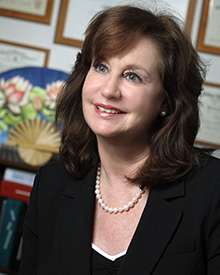
Barbara Fivush, M.D.
- Professor of Pediatrics, Division of Nephrology
- Senior Associate Dean of Women
Professional profile: Dr. Barbara Fivush was the Division Chief of Pediatric Nephrology at the Johns Hopkins School of Medicine from 1993 until 2016; and was promoted to Professor of Pediatrics in 2001. She has been involved in pediatric nephrology at the national level for many years, and has been the head of the Pediatric Committee of the Clinical Performance Measures project from 2000 to 2006, establishing the national standards for care of pediatric dialysis patients. She has been an active member of the American Society of Nephrology, and served on the Council for 9 years. Her research interests centered on pediatric End-Stage Renal Disease and Chronic Kidney Disease, and she was instrumental in setting the standards for immunization of pediatric ESRD patients. In 2016, she received the Henry L. Barnett award in Pediatric Nephrology, recognizing her for outstanding teaching and clinical care.
In 2003, Dr. Fivush developed a strong interest in gender equity and was appointed the Co-Director of the SOM Women’s Leadership Council. She participated on the committee for faculty development and gender, whose findings were pivotal in the 2008 formation of the inaugural Office of Women in Science and Medicine. Dr. Fivush became the Associate Dean to direct this office. She collaboratively designed and organized the Leadership Program for Women Faculty, the Emerging Women Leadership Program and the Executive leadership program for women faculty. She was promoted to Senior Associate Dean of Women in 2018. She has served on the steering committee of the Association of American Medical Colleges Group on Women in Medicine and Science, and is an ELAM graduate.
Mary Foy
- Senior Associate Dean/Registrar Emerita
- School of Medicine, Office of the Dean
Margaret (Meg) Garrett, J.D.
- School of Nursing and Johns Hopkins Health System
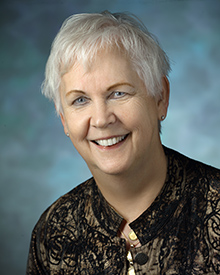
Charlotte Gaydos, M.S., M.P.H., Dr.P.H.
- Professor of Medicine, Infectious Disease Division
Professional profile: Charlotte Gaydos is a Professor in the Department of Medicine, Infectious Disease Division, Johns Hopkins University School of Medicine, President of the International Union Against Sexually Transmitted Infections (IUSTI), and member of the Johns Hopkins University Center for Global Health. She received her B.S. in medical technology and her M.S. in medical microbiology from West Virginia University. Her MPH and DrPH in immunology and infectious diseases were received from Johns Hopkins University School of Public Health. She is the Director of the Johns Hopkins University International STI, Respiratory Diseases, and Biothreat Research Laboratory. She has over 50 years of experience in microbiology laboratory diagnostics and is an internationally recognized leader in sexually transmitted diseases (STDs) diagnostic and epidemiology research, diagnostics in community acquired pneumonia and emerging/respiratory microbiology. She has authored 28 book chapters, over 500 research articles, and over 700 research abstracts and oral presentations.
Gaydos has conducted many FDA clinical trials for new diagnostics for Chlamydia trachomatis, Neisseria gonorrhoeae, Trichomonas vaginalis, and Mycoplasma genitalium, as well as for respiratory microorganisms. Her CAP/CLIA-compliant research laboratory is a CORE Diagnostic/Reference Laboratory for international studies of STIs, respiratory diseases, and trachoma. She has published regarding research for developing DNA amplification assays for cervical, urethral, and urine specimens, prevalence, incidence, and for epidemiological studies for STIs in schools, the military, and international populations, as well as studies of cost-effectiveness analyses. Gaydos has been Co-investigator for the Diagnostics Program for the NIH Mid-Atlantic Research Center of Excellence for 10 years for emerging and biothreat diseases and participated in many community acquired pneumonia studies. She is the Co-P.I. of a NIH funded Center in its 11th year for the development of point of care (POC) diagnostics for STDs, as well as a Co-P.I. on a R-01 for the Development of a POC and antimicrobial resistance assay for gonorrhea and a co-investigator for an NIH Center of Excellence in Influenza Research and Surveillance.
Personal profile: I am married to Joel C. Gaydos MD, MPH, retired US Army colonel and have four children: Kathryn L. Morici, M.D., M.P.H., Joseph Karl Gaydos, V.M.D., Ph.D., Steven John Gaydos, M.D. M.P.H., Jennifer Ann Lassahn, B.A., M.A. We have 14 wonderful grandchildren ranging in age from 25 to 4 years – 5 college graduates and 9 to go! We have had military tours in Okinawa, Japan and Germany. We recently purchased a home in Gettysburg, PA and will eventually move there fulltime; it is not far from JHU. My hobbies include reading, traveling, and gardening with bonsai trees, as well as hiking.
Academy interests: I am interested in continuing to work on my NIH studies, as well as mentoring students, post docs, and ID fellows.
Clarence Gehris, M.D.
- Assistant Professor of Otolaryngology, Head and Neck Surgery
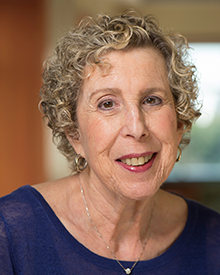
Linda Gerson, Ph.D., R.N.
- Assistant Professor (retired) Johns Hopkins University School of Nursing

Francis Giardiello, M.D.
- Professor of Medicine, Gastroenterology
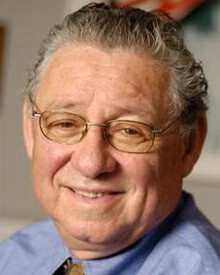
Alan M. Goldberg Ph.D.
- Professor Emeritus, Toxicology (Retired 2022)
- Associate Dean, Bloomberg School of Public Health (1985-2000)
- Founding Director Emeritus, Center for Alternatives to Animal Testing (CAAT) (1981 -2009)
- Principal, The Global Food Ethics Project, Berman Institute (2012- 2020)
- Associate Chair (EHE)- Inclusion, Diversity, Anti-Racism, and Equity (2020 -2022)
Professional Profile: Dr. Goldberg received his B.S. from the Brooklyn College of Pharmacy, and his Ph.D. in Pharmacology from the University of Minnesota. After doing postdoctoral work at the University of Indiana, he joined the faculty at Indiana University. He then moved to Johns Hopkins University School of Public Health. His research areas included cholinergic biology, neurotoxicology, the development of in vitro methodology in risk evaluation and safety assessment, and Food Ethics. He is the author of over 100 scientific articles and the editor of more than 15 books. Dr. Goldberg has served on numerous national and international government and non-government panels. He is the first recipient of the Russell and Burch Award of the Humane Society of the United States, was awarded the 1998 Society of Toxicology’s Ambassador of Toxicology, and in 2001 received the Society of Toxicology’s Enhancement of Animal Welfare Award. Dr. Goldberg is a Professor (Emeritus) of Toxicology at The Johns Hopkins University and was the Founding Director and Chairman of the Board of the Johns Hopkins Center for Alternatives to Animal Testing at the Johns Hopkins Bloomberg School of Public Health. Dr. Goldberg served in the Dean’s Office at the Johns Hopkins University School of Hygiene and Public Health for 15 years. In the last few years, before retirement, Dr. Goldberg developed the Inclusion, Diversity, Anti-Racism and Equity program for the Department of Environmental Health Engineering.
Personal Profile: I came to Hopkins for 3 years in 1969 and stayed for 53. I am married to Helene Schoenbach Goldberg (62 years so far). I have 3 children (2 biologic). I have 4 grandchildren that are all amazingly different and wonderful. They are living throughout the US.
My interests include food, travel, and learning. I have spent considerable time in The Netherlands and Italy. I had sabbaticals in Utrecht, Paris, and Jerusalem. These living experiences have influenced me greatly.
Academy Interests: Hopefully, as we get better control of Covid, I would like to be involved with speakers and speakers’ dinners. Having just retired I need a few months of organizing the next stages of my life.
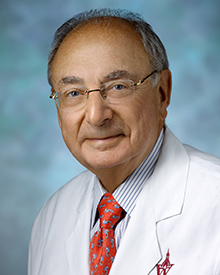
Morton F. Goldberg, M.D., F.A.C.S.
- Joseph E. Green Professor of Ophthalmology
- Director Emeritus, Wilmer Ophthalmological Institute
- Johns Hopkins University School of Medicine
- The Johns Hopkins Hospital
Professional profile: Morton Goldberg is the Joseph E. Green Professor of Ophthalmology and director emeritus at the Wilmer Eye Institute of the Johns Hopkins University School of Medicine in Baltimore. From 1989 to 2003 he served as the director and William Holland Wilmer Professor of Ophthalmology at the Wilmer Institute. He received his bachelor’s and medical degrees with honors from Harvard College and Harvard Medical School, respectively, and completed an ophthalmic residency and chief residency at Wilmer. In 1970, at the age of 32, Goldberg became professor and chairman of ophthalmology at the University of Illinois College of Medicine in Chicago. He returned to Wilmer in 1989 as director.
Goldberg’s major interests include vascular retinal diseases, including sickle cell eye disease and diabetes. He has authored and edited 10 books and over 500 scientific and clinical publications. He has served as president of the Macula Society, the Association for Research in Vision and Ophthalmology, and the Association of University Professors in Ophthalmology. He also served for 10 years as editor of the Archives of Ophthalmology.
His awards include membership in the National Academy of Medicine, the Howe Medal of the American Ophthalmological Society, an honorary medical degree from the University of Coimbra in Portugal, and an honorary fellowship in the Royal Australian College of Ophthalmologists, among others.
Goldberg currently serves as a member of the board of directors of EyeGate Pharmaceuticals, Inc.; and a founder and trustee of the RYR-1 Foundation.
Personal profile: I have been happily married to Myrna Davidov Goldberg for 51 years. Myrna is a docent at the Baltimore Museum of Art. We have two amazing sons. Matthew is married to Maria, has two adorable, beautiful boys, and is an energy lawyer in New York City. Michael is married to Lindsay and also has two adorable, beautiful boys; is chief of neuroradiology at Allegheny Medical Center in Pittsburgh and president of the RYR-1 Foundation. Myrna and I also have a Havanese dog, Matisse. I try, in general, to be a renaissance man who loves learning, teaching, traveling, artwork and music.
Academy interests: I continue to work at Johns Hopkins in the Wilmer Eye Institute, mentor, and attend and participate in as many lectures/conferences as possible. I also continue doing research with residents, fellows and other faculty, focusing mainly on incontinentia pigmentosa and sickle cell disease, and many others.
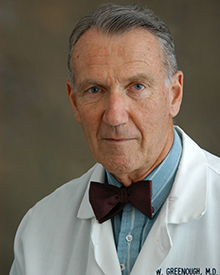
William B. Greenough, III, M.D., F.A.C.P.
- Professor of Medicine and Professor of International Health, Bloomberg School of Public Health
Professional profile: William Greenough grew up in Providence, Rhode Island. He joined the Johns Hopkins Department of Medicine in 1967, recruited by C.C.J. Carpenter. He graduated from Amherst College in 1953 magna cum laude, and received his medical degree from Harvard in 1957 cum laude. His internship and residency were at Columbia Presbyterian Hospital, New York. His fellowship in hematology was with E. Donnall Thomas at the Mary Imogene Bassett Hospital in Cooperstown, New York, in 1959, where they performed the first bone marrow transplants in North America. Thomas went on to win the Nobel Prize. Greenough’s senior residency was at the Peter Bent Brigham Hospital in Boston in 1961–1962.
In 1962, Robert S. Gordon Jr., of the National Heart Institute, recruited Greenough to join the Pakistan-SEATO Cholera Research Laboratory in Dhaka, Bangladesh. He was chief of the Johns Hopkins Infectious Diseases Division from 1969 until returning to Bangladesh in 1977 to establish and direct the International Centre for Diarrhoeal Disease Research Bangladesh (ICDDR,B).
Greenough returned to Baltimore in 1985, joining the Division of Geriatric Medicine and becoming medical director of the Johns Hopkins Bayview specialty hospital programs.
Among his many awards were the King Faisal Prize in International Medicine and the Maurice Pate UNICEF Gold Medal on behalf of ICDDR,B. He is director of Cera Products, Inc., and chairs the independent data monitoring committee for the global C. difficile vaccine trial. He has over 200 original scientific papers and a monograph on cholera. He had television appearances on Nova and 20/20 for his work on cholera.
"A better, safer way to reopen" (The Tampa Bay Times, 2020)
"Early Heroes of Cholera Research Lab" (2020)
Personal profile: My first wife, Jane C. Woodruff, died while we were in Dhaka in 1964. I married Quaneta Ahmed in 1965 and we have five children scattered across the U.S. We are both happy not to travel now. Until my 88th year I was a runner competing in 14 marathons and was on the organizing committee for the first Maryland marathon. I now swim and enjoy having time to read novels.
Academy interests: I plan to focus on the history of Johns Hopkins’ role in understanding the treatment and prevention of cholera and how it has related to the overall global achievements of ORT, an inexpensive oral cholera vaccine, and discovery of the mechanism of cholera and related diarrheal diseases. The results of these studies have saved and will continue to save countless lives globally. They could also be applied in American medicine and other resource-rich countries to improve health care.
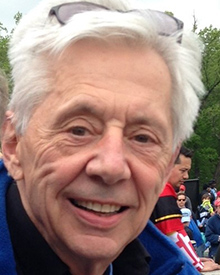
Michael Guarnieri, Ph.D., M.P.H.
- Research Associate
- Emeritus Faculty, 2005
Professional profile: Trained as a chemist, Michael Guarnieri came to Johns Hopkins in 1968 as a fellow in physiological chemistry. Appointed to the new Department of Neurology in 1970 to develop its research programs, he invented the first molecular test for multiple sclerosis. He left Johns Hopkins in 1975 to commercialize diagnostic tests for biotech firms. In 1985, he returned to Johns Hopkins to work in pharmacology, pathology and, since 1995, pediatric neurosurgery. His work involved biomarkers for neurodegenerative syndromes, pediatric neuro-oncology, epilepsy surgery, clinical outcomes in achondroplastic populations, and the chemistry of delivery systems for long-acting analgesia. From 1995 to 2005, he worked with the American Chemical Society on safety systems for injury control. He continues to consult for government and industry in the science of harm reduction. He has founded drug companies to commercialize long-acting, post-surgical analgesia for veterinary medicine, and for nondivertible opiate analgesia for outpatient surgeries.
Guarnieri’s current work includes safety research for injury control in high-energy environments. He is working with Johns Hopkins Technology Ventures to commercialize veterinary and human drugs.
Personal profile: I married Susan Russ in 1964 while we were both students at Ohio State University in Columbus. Susan, a physician, specialized in preventive medicine. She retired as the medical officer for BGE/Constellation Energy. She currently serves on hospital and university advisory committees. Daughter Bridget, a site leader for Olin Chemicals, lives in Galveston with her three children. Son Frank, a hospitalist, lives in Waterville, Maine, with his three children. Susan and I are art collectors and museum buffs. We have published two books on stone and metal sculptures.
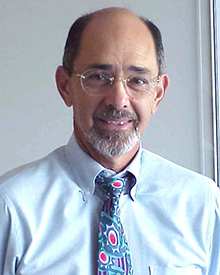
Bernard Guyer, M.D.
- Professor Emeritus of Population and Family Health
Karen Haller, Ph.D., M.P.H., R.N.
- Former Chief Nursing Officer at the Johns Hopkins Hospital

Marta Hanson, Ph.D.
- Former Faculty, History of Medicine
Katharine Harrison, M.D.
- Professor of Medicine, Internal Medicine
Barbara Hawkins, Ph.D.
- Professor Emerita of Opthalmology
- Professor of Epidemiology
Robert Heinz, Ph.D.
- Associate Professor of Psychiatry and Behavioral Sciences, Behavioral Biology
Martha Hill, Ph.D.
- Professor and Dean Emerita, Johns Hopkins University School of Nursing
Nancy Hutton, M.D.
- Professor of Pediatrics
- School of Medicine

Michel Ibrahim, M.D.
- Professor of Epidemiology
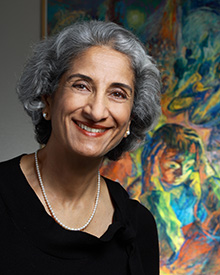
Geetha Jayaram, M.D., M.B.A.
- Associate Professor of Medicine, Psychiatry, Public Health
Robert Jensen, Ph.D.
- Professor Emeritus of Cell Biology
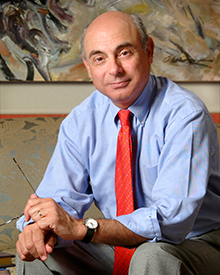
Michael M.E. Johns, M.D.
- Professor, Schools of Medicine & Public Health | Emory University
- Executive Vice President for Health Affairs Emeritus | Emory University
- President, CEO, & Chairman of the Board Emeritus| Emory Healthcare
Professional profile: Michael Johns is recognized as a leader in academic medicine and health policy, and as a head and neck cancer surgeon.
He currently is professor in the schools of medicine and public health at Emory University. He served as executive vice president for Health Affairs at Emory University, and president, CEO and chairman of the board of Emory Healthcare from 1996 to 2007. During this time, Johns led the transformation of the Health Sciences Center into one of the nation’s leading centers in education, research and patient care. He also served as Emory’s chancellor from 2007 to 2012. Prior to coming to Emory, he was vice president of the medical faculty and dean of the Johns Hopkins University School of Medicine from 1990 to 1996. At Johns Hopkins, he also served as chair of otolaryngology–head and neck surgery from 1984 to 1990.
Johns has served on various private sector and philanthropic boards, including The Institute of Medicine, the American Board of Otolaryngology, The Council of Teaching Hospitals, The Association of Academic Health Centers, Johnson & Johnson, the Genuine Parts Company and AMN Healthcare, among others. He is a member of the board of regents of the Uniformed Services University of the Health Sciences, as well as the Vanderbilt University Medical Center Board and the University of Michigan Health System Board.
In addition to leading complex administrative and academic organizations, Johns is widely renowned as a catalyst of new thinking in many areas of health policy and health professions education. He has been a significant contributor to many of the leading organizations and policy groups in health care, including the National Academy of Medicine.
Johns received his bachelor’s degree at Wayne State University in his hometown of Detroit and graduated with distinction from the University of Michigan Medical School.
Personal profile: I am married to Trina Johns (over 52 wonderful years together), and we have two children and five grandchildren. Both our daughter (Christina, a pediatrician in Annapolis) and son (Michael III, an otolaryngologist at University of Southern California) are accomplished physicians, and we could not be prouder of them! And they both are Johns Hopkins University School of Medicine graduates. Trina and I divide our time between homes in Atlanta, Georgia, and Lake Toxaway, North Carolina. We enjoy traveling, reading (we are both active members of book clubs) and spending time with family and friends.
Academy interests: mentoring, coaching and social activities
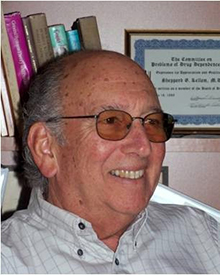
Sheppard G. Kellam, M.D.
- Professor Emeritus, School of Public Health
Professional profile: Sheppard Kellam was appointed Professor and Chair of the Department of Mental Hygiene in 1982, now the Department of Mental Health, and continued to serve as chair until 1993. Before coming to Johns Hopkins, he completed his medical degree at the University of Maryland, medical internship at Bellevue Hospital, two years psychiatric residency at Yale. He then spent 4 years at the NIMH in studies of psychiatric wards and communities and the role of the new psychiatric medications. He then moved to the Southside of Chicago with help from NIMH, the Chicago Board of Health, the University of Chicago and support from Chicago’s Woodlawn community, where the team worked through trust with a Board of Woodlawn citizen community leaders. With oversight of the Board the public health team carried out developmental epidemiological studies of 4 consecutive annual cohorts of 1st graders in 12 elementary schools, periodically throughout elementary and well into adulthood. These studies revealed early risk of attention and aggression behavior problems in early first grade that proved to be important antecedents and possibly correctable in first grade and possibly beyond.
Working in close partnership with the Baltimore City Public School system, Kellam led three generations of large-scale epidemiologically based randomized field trials systematically testing universal preventive interventions in classrooms directed at early antecedents of long-term problem outcomes. An intervention of particular importance was the “Good Behavior Game,” a classroom behavior management method for socializing children to the role of student while offering teachers a method for managing classroom behavior in a way that does not compete for instructional time. By young adulthood, significant and meaningful reductions were found, mainly among males, compared to randomized control groups for all the problem outcomes cited (drug and alcohol abuse and dependence, daily regular tobacco use, antisocial personality disorder, delinquency and incarceration, use of school-based services, and school failure). This work began in 1984 and is continuing.
In 1996, Kellam was awarded the Rema Lapouse Award for lifetime contributions to public health and prevention science by the Mental Health, Epidemiology, and Statistics Sections of the American Public Health Association. In 1999, the World Federation for Mental Health presented him their Distinguished Public Mental Health Award for his work in advancing the science for prevention of mental and behavioral disorders. He was the first president elected by the full membership of the Society for Prevention Research from 1998 to 2001. In 2008, he was awarded the Presidential Award of the Society for Prevention Research.
Personal profile: My wife, Margaret Ensminger, is a professor in the Department of Health, Behavior, and Society. We have three sons, all in the arts, theatre and writing.
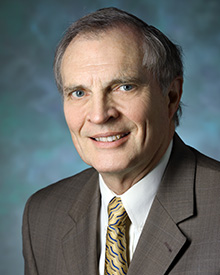
David E. Kern, M.D., M.P.H., M.A.C.P.
- Emeritus Professor of Medicine
Professional profile: David Kern received his bachelor of arts degree from Princeton University in 1966, his medical degree from Harvard University in 1971, and his master of public health degree from The Johns Hopkins University in 1978. He interned at Rush-Presbyterian-St. Luke’s Hospital in Chicago, and, after two years in the United States Public Health Service Indian Health Service in Arizona, completed his internal medicine residency and chief residency at Baltimore City Hospitals (now Johns Hopkins Bayview Medical Center) in 1979. He was a Robert Wood Johnson clinical scholar fellow at Johns Hopkins from 1976 to 1978.
Kern served for 25 years as co-director then director of the Division of General Internal Medicine at Johns Hopkins Bayview, and was instrumental in developing the Johns Hopkins General Internal Medicine Residency Program, the Johns Hopkins Faculty Development Program for Clinician-Educators, and the medical education track of the Johns Hopkins fellowship program in General Internal Medicine. He served on the board of directors of the Academy of Communication in Healthcare from 2013 through 2018, and was its president in 2015. His publications focus on medical education, curriculum development, communication skills and psychosocial medicine, professional growth and ambulatory practice. They include the book Curriculum Development for Medical Education: A Six-Step Approach, which has become a standard reference for curriculum development in medical education.
Although now retired, he continues to lead an inpatient team for four weeks per year on the patient-centered Aliki service at Johns Hopkins Bayview. He also continues to teach and mentor in the curriculum development arm of the Johns Hopkins Faculty Development program.
Personal profile: I am married with three adult children, and expecting a first grandchild. My wife is a retired federal judge. We have traveled extensively, and more so since retirement. I enjoy family, friends, jogging, swimming, hiking, kayaking, occasional golf, reading, theater and good food.
Academy interests: Mentoring (curriculum development, career development for clinician-educators, educational scholarship, leadership); coaching clinicians (in communication skills); and coaching teachers. Available to speak on / teach curriculum development, educational scholarship, leadership, leadership transition, time management, mentorship and organizational/culture change.
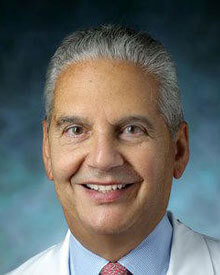
Nagi Khouri, M.D.
-
Associate Professor of Radiology, Breast Imaging
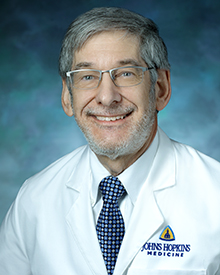
Edward Kraus, M.D.
- Professor of Medicine, Nephrology
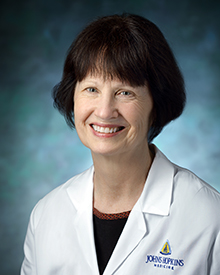
Beth L. Laube, Ph.D.
- Professor of Pediatrics
Professional profile: Beth Laube is professor of pediatrics at the Johns Hopkins University School of Medicine in the Eudowood Division of Pediatric Respiratory Sciences. Laube’s research is translational in nature and is centered on in vivo and in vitro quantification of the deposition and removal of particles in healthy and diseased lungs and noses. Through her research, she has demonstrated that radiolabeled aerosols and scintigraphic imaging are valuable tools for the development of aerosol therapies for asthma, cystic fibrosis and diabetes as well as for patients who have had lung transplants. Laube currently serves as chair of the advisory committee for the T32 Multidisciplinary Training Program in Pediatric Pulmonary Medicine and is a member of the editorial board of the Journal of Aerosol Medicine and Pulmonary Drug Delivery. She and others recently developed and initiated a scholarly writing class for postdoctoral fellows in the Department of Pediatrics. From 2001 to 2018, she chaired the Pediatric Protocol Review subcommittee of the Johns Hopkins University School of Medicine Institute for Clinical and Translational Research. She served as president of the International Society for Aerosols in Medicine from 2005 to 2007. She participated in the World Health Organization’s Product Development Group for Aerosolized Measles Vaccine (2003–2007) and collaborated on a Bill and Melinda Gates Foundation grant to develop a powder aerosol measles vaccine. Laube has served as mentor/adviser to numerous predoctoral candidates, postdoctoral fellows and junior faculty and has published over 50 peer-reviewed articles.
Personal profile: I love to travel, play bridge and sing. Many of my travels include a Broadway musical, an opera or a ballet. I am a member of the Johns Hopkins Osher Program and enjoy their class offerings very much. I have been treasurer of my homeowners association for the past 16 years.
Academy interests: mentoring/advising predoctoral candidates (Ph.D.s), postdoctoral fellows and junior faculty (Ph.D.s), community volunteering, and coordinating speakers and talks

Philip Leaf, Ph.D.
- Professor Emeritus of Mental health, Public Health
Gary Lees, M.S.
- Professor of Art as Applied to Medicine

Maureen Lefton-Greif, Ph.D.
- Professor of Pediatrics, Pulmonary
John Lipsey, M.D.
- Associate Professor, Psychiatry and Behavioral Sciences
- School of Medicine
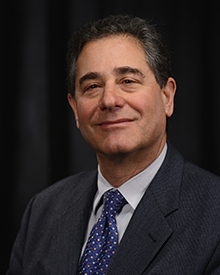
Thomas A. Louis, Ph.D.
- Professor Emeritus of Biostatistics, Bloomberg School of Public Health
Professional profile: Thomas Louis, professor emeritus of biostatistics at Johns Hopkins Bloomberg School of Public Health, joined Johns Hopkins in 2002. From 2013 to 2015 he was also associate director for research and methodology/chief scientist for the U.S. Census Bureau. Currently, he is senior statistical consultant for the Center for Drug Evaluation and Research at the Food and Drug Administration. He was formerly assistant professor of mathematics at Boston University; associate professor of biostatistics at Harvard University’s school of public health; professor and head of biostatistics at the University of Minnesota’s school of public health; and senior statistical scientist at Rand. His research includes Bayesian methods, clinical and field studies, health services research, environmental risk assessment, genomics and survey methods.
Louis is an elected member of the International Statistical Institute; a fellow of the American Statistical Association (ASA), the American Association for the Advancement of Science (AAAS) and the Institute of Mathematical Statistics; and a national associate of the National Research Council. He served as coordinating editor of The Journal of the American Statistical Association, co-editor of Biometrics and president of the International Biometric Society. He chaired the ASA section on Bayesian statistical science and the AAAS statistics section. Other service includes the Health Review Committee of the Health Effects Institute, the National Institute of Environmental Health Sciences Board of Scientific Counselors, and chair of the Committee of Presidents of Statistical Societies- Centers for Medicare & Medicaid Services committee on assessing hospital performance.
His service via the National Academies includes the Committee on National Statistics, the Committee on Applied and Theoretical Statistics, the Panel on Estimates of Poverty for Small Geographic Areas, the Panel on Formula Allocation of Federal and State Program Funds (chair), the Board of the Medical Follow-up Agency, the Panel to Assess the Health Consequences of Service in the Persian Gulf War, the Committee on the use of Third Party Toxicity Research and the Standing Committee on Risk Assessment.
Personal profile: I am married to Germaine Buck Louis, dean of the College of Health and Human Services, George Mason University. We enjoy six children and five grandchildren, sailing, travel and being with friends. We spend as much time as possible at our home in St. Michaels, Maryland.
Academy interests: mentoring faculty, occasional advice on statistical issues
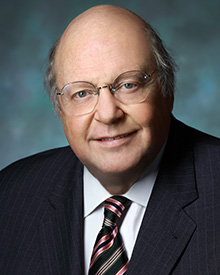
Paul Manson, M.D.
- Professor of Plastic Surgery, Craniofacial
Robert Massof, Ph.D.
- Professor of Ophthalmology
- School of Medicine
Lowell Maughan, M.D.
- Professor of Medicine, Cardiology
Edward McCarthy, M.D.
- Professor of Pathology, Surgical Pathology
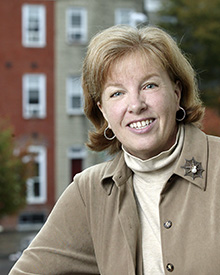
Betsy McCaul, Ph.D.
- Professor of Psychiatry & Behavioral Sciences
Deborah A. McClellan, Ph.D.
- Research Associate, Pharmacology and Molecular Sciences and Division of Health Sciences Informatics (retired)
Professional profile: Deborah Ann McClellan came to the Department of Pharmacology and Molecular Sciences as resident editor and research associate in 1986, doing substantive content editing of journal articles, grants and other documents for departmental faculty. In 1991, she began lecturing in scientific writing for the Welch Library, and in 1995, she was appointed research associate in health sciences informatics.
McClellan taught credit and continuing education courses in scientific writing, serving as course director for graduate courses in the schools of medicine and public health. She was a regular guest lecturer for fellowship training programs, departments and scientific communication lecture series throughout the university.
As an author’s editor, she provided substantive editing of scientific documents for hundreds of researchers at Johns Hopkins and other universities around the world. She was an editorial consultant/instructor in the Clinical Investigation Training Program (school of medicine), Center for Collaborative Intervention Research (school of nursing), Master of Public Health Program (school of public health), and National Institute on Aging (National Institutes of Health), among others.
McClellan was also founder and director of the Editing Referral Service, which still connects Johns Hopkins researchers with high-quality editing by approved, university-affiliated freelance editors and has served as a model for Yale’s medical library and others. In addition to her published papers, she has edited more than 1,500 scientific papers, books, grants and doctoral theses.
McClellan earned her bachelor’s degree in zoology from Drew University and her doctorate in cell biology from Johns Hopkins (school of arts and sciences). She did postdoctoral work as a research immunochemist at Becton, Dickinson before coming to Johns Hopkins.
Personal profile: I am married to David McClellan (retired mathematician, U.S. Department of Defense) and have two wonderful children, Christina and Kevin (both distance education specialists at Connections Education, Inc.). My husband and I love traveling; in between trips, I still work as an author’s editor for select clients across the globe. In addition to being active at my church, I enjoy gardening, music (singing and playing baritone horn), genealogical research and calligraphy.
Academy interests: Health issues prevent me from taking an active role in the Academy, but I am happy to speak with students or fellows interested in learning more about scientific editing as a career.
Robin McKenzie, M.D.
- Associate Professor of Medicine, Division of Infectious Disease
- School of Medicine
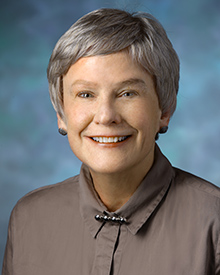
Julia McMillan, M.D.
- Professor Emerita
Professional profile: Julia McMillan joined the Department of Pediatrics at Johns Hopkins in 1991 as deputy director and residency program director. She served as residency program director until 2012. In 1995 she was appointed vice chair for education, and in 2012 she became executive vice chair. She was appointed associate dean for graduate medical education in 2004, a position she held until her retirement in 2016.
McMillan completed medical school, pediatric residency and a fellowship in pediatric infectious diseases at the State University of New York Health Science Center at Syracuse and remained on the faculty there for 10 years before moving to Johns Hopkins. Her research investigated Mycoplasma pneumoniae and respiratory viral infections in children.
McMillan was editor-in-chief of the third and fourth editions of the textbook Oski’s Pediatrics: Principles and Practice and editor-in-chief of Contemporary Pediatrics from 1996 to 2013. She served as medical editor of the Infectious Diseases Sub-Board Examination for the American Board of Pediatrics for 15 years and was a member of the American Academy of Pediatrics’ Committee on Infectious Diseases from 2001 to 2007. From 2007 to 2013 she was a member of the Pediatrics Review Committee for the Accreditation Council for Graduate Medical Education.
McMillan has served as chair of the board of directors of the American Board of Pediatrics and on numerous committees of the board. She has been a representative of the ABP to the American Board of Medical Specialties. She is currently working with the ABP to enhance behavioral and mental health care of children and adolescents by pediatricians.
Personal profile: I am married to Jed Dietz, founding director of the Maryland Film Festival. We have three children: Edith Dietz, a graduate of the Johns Hopkins University School of Medicine and Harriet Lane residency, currently a pediatrician at Johns Hopkins Bayview; Robert, director of North American Business Operations at Groupon in Chicago; and Elihu, project consultant for Energy and Resource Solutions in New York City. Jed and I continue to live in Baltimore full-time. Now both retired, we have begun to travel and spend time with our children and two grandchildren.
Academy interests: attending morning report and pediatric case conference weekly and mentoring residents
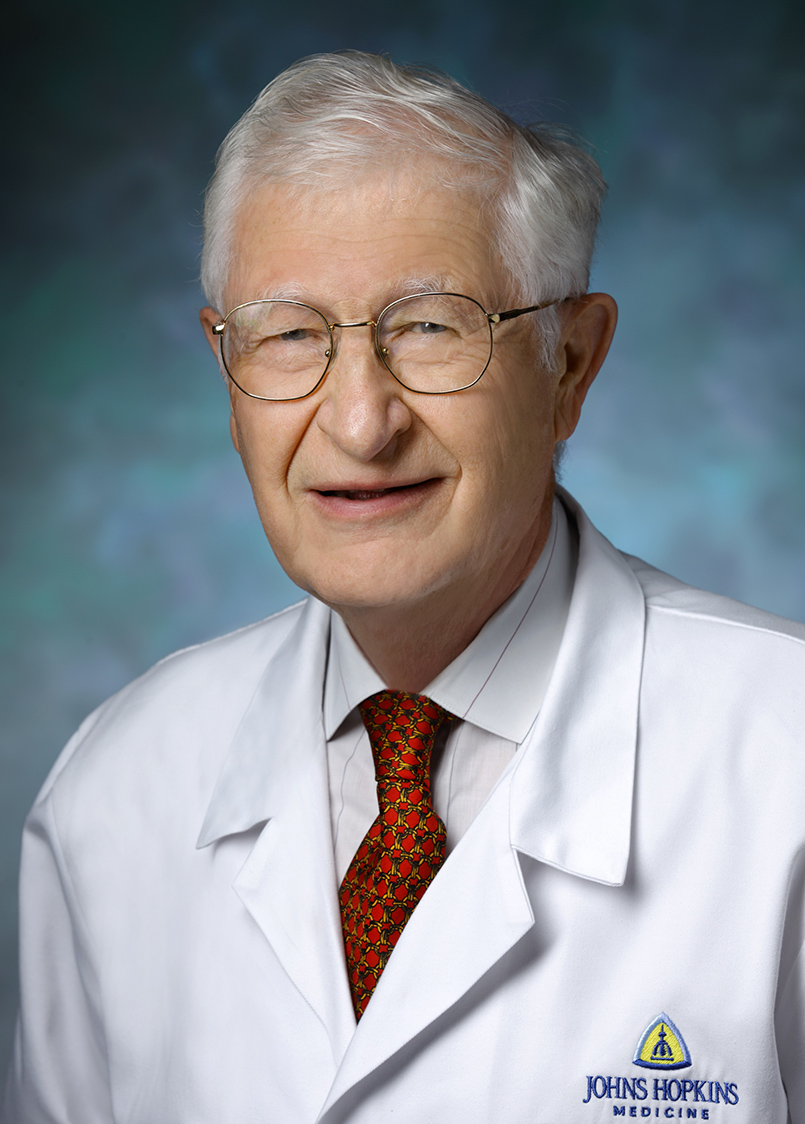
Esteban Mezey, M.D.
- Professor Emeritus, Medicine
Professional profile: Esteban Mezey joined Johns Hopkins in 1968 as an Instructor at Baltimore City Hospitals, was promoted to Professor in 1982, and in 1985 was invited to move to the Johns Hopkins Hospital by Dr. Victor McKusick. He received his B.A. degree from Yale University and his M.D. from Harvard Medical School. He completed residency in Internal Medicine and fellowship in Gastroenterology at St. Luke’s Hospital in New York City and was a Norman Jolliffe fellow in Clinical Nutrition at Columbia University.
His major contributions in research relate to alcohol metabolism, alcoholism, and liver fibrosis and cirrhosis. He identified nutritional abnormalities in alcoholism and liver disease along with their pathophysiology and consequences, and investigated causes of liver fibrosis. He discovered the role of fat soluble vitamins in attenuating liver fibrosis.
He was Director of Hepatology at both Baltimore City Hospitals and the Johns Hopkins Hospital for many years and Clinical Director of Gastroenterology/ Hepatology at Johns Hopkins for 5 years. He was chairman of the Board of Scientific Counselors at NIAAA (NIH) from 1996-1999. He was president of the American Association for the Study of Liver Diseases in 1993 and received the Distinguished Service Award of the Association in 2002. He was Chairman of the Gordon Conference on Alcohol in 1996. He received The David M. Levine Excellence in Mentoring Award of the Johns Hopkins Department of Medicine in 2013. For 49 years he managed patients with multiple liver diseases before retiring from patient care in 2017.
Personal profile: My wife, Anne Lindeman Mezey, is a musicologist. We have 3 children and 5 grandchildren. Our two daughters are physicians and our son is an independent film producer. I am very active in water sports (swimming, sculling, and sailing) and also play golf. I enjoy reading Spanish and German literature in their original languages.
Academy interests: Mentoring of young faculty in basic and clinical research. Participation in Hepatology activities at Johns Hopkins and at National and International levels. Review of manuscripts and participation in grant reviews. Social activities.
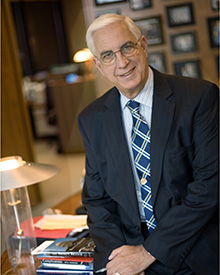
Edward Miller, M.D.
- Dean Emeritus and CEO of Johns Hopkins Medicine
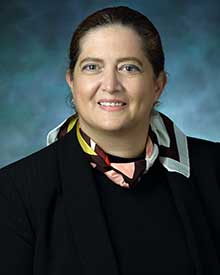
Mona Mohamed, M.B.B.Ch., M.Sc., Ph.D., M.P.H., M.E.H.P.
- Assistant Professor of Radiology and Radiological Science
Professional profile: Mona Mohamed is a radiologist and a scientist. She earned her medical degree, master’s degree and doctorate in Cairo, Egypt. She worked at Johns Hopkins for 17 years, during which time she earned her master’s of public health and master’s of education in the health professions degrees in 2011 and 2015, respectively. Mohamed’s research work was dedicated to the clinical application of advanced magnetic resonance imaging, spectroscopy and functional imaging for studies of human metabolism to evaluate patients with neurological psychiatric diseases, particularly obsessive-compulsive disorder, schizophrenia, depression, amyotrophic lateral sclerosis, brain tumors and HIV.
Mohamed is the vice president of education and treasurer of the Hopkins Toastmasters Club. Toastmasters is an international organization that teaches communication and leadership skills. Recently, she has been invited by the state department to meet Chinese women delegates and scientists to foster U.S.-China diplomatic relations and to discuss various issues faced by women in academia. She has worked for several years as a consultant radiologist in Saudi Arabia, where she was the head of the radiology department.
Academy interests: I am interested in mentoring U.S. and international graduate and postdoctoral fellows in their doctorate thesis, manuscripts and grant applications. I am also interested in mentoring and coaching Hopkins students and junior faculty members, specifically as a content mentor in imaging studies, as well as career mentor and coach.
David Moller, M.D.
- Professor of Medicine, Pulmonary and Critical Care
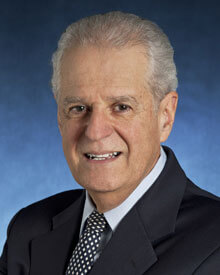
Alvaro Muñoz, PhD
-
Professor Emeritus of Epidemiology
Professional profile:
After his undergraduate studies in Mathematics at the Universidad Nacional de Colombia, Alvaro Muñoz enrolled at Stanford in 1975 where he pursued his PhD in Statistics graduating in 1980. Johns Hopkins recruited Muñoz to the Department of Epidemiology in 1986 and was appointed as an Assistant Professor; he had previously been an Instructor at the Channing Laboratory of the Harvard Medical School from 1980 to 1985. He was promoted to Associate Professor in 1987 and to full Professor in 1993. Muñoz’ primary research focus has been in the design, conduct and data analysis of cohort studies in several topics including respiratory diseases, HIV/AIDS, Human Pappiloma Virus, liver cancer, pelvic floor disorders, and kidney disease. Muñoz has collaborated on more than 300 publications and has developed novel methods for the analysis of data including survival analysis methods based on the generalized gamma distribution and mixture models for competing risks. Muñoz was instrumental in creating the Section on Epidemiology for the American Statistical Association, becoming the second chair in 1995 and was elected a fellow in 1999; he was also elected a fellow of the American College of Epidemiology in 1997. Muñoz has mentored many students and had been the advisor of the theses of 15 PhD students graduating between 1990 and 2021.
After his retirement in 2022, Muñoz remains active as part-time emeritus professor continuing his research on children with chronic kidney disease and his lecturing on advanced methods for the design and data analysis of cohort studies.
Personal Profile: I married Beatriz in 1974. Beatriz was faculty of the Wilmer Eye Institute from 1986 to 2020. We have two children: Daniel, a graduate of JHU School of Medicine and as of 2022, an associate professor of cardiology at Vanderbilt University; and Ana Isabel, a graduate from the Yale Law School and a practicing attorney in Boston. As a second distant from our beloved five (= 3+2) grandchildren, Beatriz and I enjoy hiking and traveling.
Academy interests: social & culture, speakers and talks.
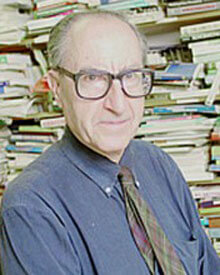
Vicente Navarro, M.D.
-
Professor of Health Policy & Management
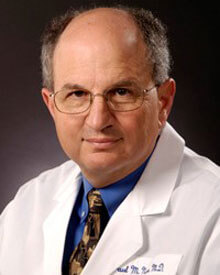
Paul Ness, M.D.
- Professor of Pathology, Transfusion Medicine
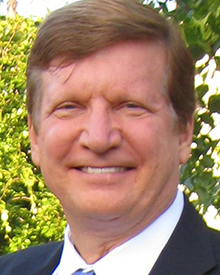
Richard B. North, M.D.
- Professor of Neurosurgery, Anesthesiology and Critical Care Medicine (retired), Johns Hopkins University School of Medicine
- President, Neuromodulation Foundation, Inc. (charitable nonprofit)
Professional profile: Richard North attended Harvard University before coming to Johns Hopkins for its accelerated “2-5” combined B.A./M.D. program and for postdoctoral training in biomedical engineering. After a surgical internship at Duke University, he returned to Johns Hopkins for neurosurgery training, where he continued on the full-time faculty, directing the Neurosurgery Spine Service for 16 years and co-directing the Division of Functional Neurosurgery for 10 years. From 1998 through 2003 he founded and served as CEO of Stimsoft, Inc., which developed patient-interactive implanted stimulator technology. He holds over 30 patents in the field of implanted electrical stimulation devices and has authored over 180 publications. He has been certified by the American Board of Neurological Surgery and the American Board of Pain Medicine and has held offices and received multiple awards from pain and neuromodulation societies. Since retiring from clinical practice, he has remained active in the field as president of the charitable nonprofit Neuromodulation Foundation.
Personal profile: Rick and his wife, Tatyana, an engineer, have four children and one grandchild. They share interests in the arts and architecture, restoring their midcentury house on Lake Roland, where Rick still enjoys rowing, literally and metaphorically.
Academy interests: mentoring, coaching, teaching, and lecturing in the above specialty areas
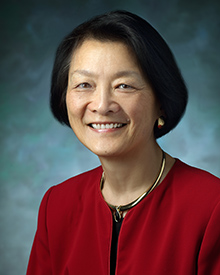
Pamela Ouyang, M.B.B.S.
- Professor of Medicine, Cardiology
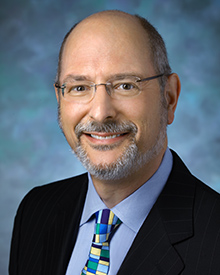
Jeff Palmer, M.D.
- Professor Emeritus of Physical Medicine and Rehabilitation
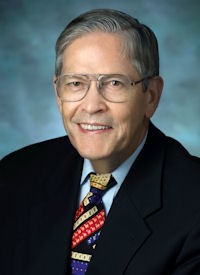
Peter L. Pedersen, Ph.D.
- Professor, Department of Biological Chemistry
- Member at large, Sidney Kimmel Comprehensive Cancer Center
- Johns Hopkins University School of Medicine
Professional profile: Peter Pedersen is a professor of biological chemistry and oncology at the Johns Hopkins University School of Medicine. His research has focused on cell energetics, its molecular and chemical basis, and relationship to both disease and health and to the discovery of new therapies.
Specifically, his research has focused on both mitochondrial and glycolytic processes at the tissue, cell and molecular level, as well as the relationship of these processes to cancer and heart disease, the two leading causes of death in the U.S., with the ultimate goal of developing new therapies.
Pedersen graduated from the University of Tulsa with a bachelor’s degree in chemistry. He earned a doctorate in chemistry from the University of Arkansas. He proceeded to the Johns Hopkins University School of Medicine as a postdoctoral fellow in the Department of Physiological Chemistry (now biological chemistry).
Pedersen has been an active educator during his tenure, instructing such courses as preclinical sciences, biochemistry and metabolism to the medical students in the school of medicine. In doing so, he has received countless awards recognizing his important role in the preclinical coursework. He has been a prolific author, having published over 366 articles with abstracts and 241 without abstracts.
Personal profile: I was born in Muskogee, Oklahoma, as the second son of a strawberry farmer and a chemistry teacher. Throughout my childhood, I learned to tolerate very hot summer weather and to do hard physical work in the fields for hours. I do enjoy gardening and outdoor activities.
I have one older brother and a younger brother. My younger sister passed away about 10 years ago due to cancer complications. I also have four children (two sons and two daughters).
Academy interests: Mentoring, coaching, teaching, precepting, community volunteering, social activities, coordinating speakers and talks

Ronald R. Peterson
- President Emeritus, Johns Hopkins Health System
Professional profile: Ronald R. Peterson is president emeritus of the Johns Hopkins Health System. He stepped down on Dec. 31, 2017, after 44 years of service to Johns Hopkins, 20 years of which he held the dual roles of president of the Johns Hopkins Health System and executive vice president of Johns Hopkins Medicine — the umbrella alliance uniting the health system and the Johns Hopkins University School of Medicine. He was the first person to hold both posts. During this same time period, he served as president of The Johns Hopkins Hospital, prior to which he held the position of president of Johns Hopkins Bayview Medical Center, the former Baltimore City Hospitals.
Among his many civic activities, Peterson serves as vice chairman of the Governor’s Workforce Development Board and holds an appointment on the Notre Dame of Maryland University President’s Advisory Council. He serves on the boards of The Center Club, the Kennedy Krieger Institute and the Maryland Business Roundtable for Education. He is chairman of the board of the Living Classrooms Foundation and co-chair of the board of Turnaround Tuesday.
Personal profile: I live in Bel Air, Maryland, with my wife, Elizabeth “Rooney” Peterson. Our daughter, Susie, a graduate of the Johns Hopkins University School of Medicine, is a member of the emergency medicine faculty at Johns Hopkins, and our son, Joe, is an attorney in Baltimore. We have five delightful grandchildren.
In my leisure time, I enjoy spending time with the family at our Rehoboth Beach home, bicycling, kayaking and walking on the beach.
Academy interests: mentoring, teaching, community board member, potential participation in oral history of Johns Hopkins Medicine
Fernando Pineda, Ph.D.
- Associate Professor of Molecular Microbiology & Immunology
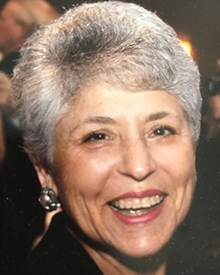
Leslie Parker Plotnick, M.D.
- Professor Emerita, Pediatrics
Professional profile: Leslie Plotnick graduated with honors from the University of Maryland School of Medicine in 1970. She started at The Johns Hopkins Hospital on July 1, 1970, as a pediatric intern and resident, and then became a research and clinical fellow in the Division of Pediatric Endocrinology. After training, she joined the faculty in 1974 and remained there for her entire career. She was promoted to full professor in 2000, one of the first 100 woman professors at Johns Hopkins (No. 71). She served as clinical director of the division for many years and as interim division director twice.
Plotnick’s major interests were in type 1 diabetes and growth. She authored and co-authored many papers and chapters on these topics, and was invited to write textbook chapters on these and other pediatric endocrine topics. She was chosen as one of several pediatric endocrinologists to write pediatric standards of care for the American Diabetes Association. In addition, she was invited to participate in numerous clinical trials over the last few decades, primarily in the areas of growth and growth hormone use. From 2007 to 2017 (retirement), she was the inaugural holder of an endowed chair.
Along with Loretta Clark, R.N., Plotnick developed a comprehensive pediatric diabetes clinic, which continues to grow. They received the Stars of Hope award from the Juvenile Diabetes Research Foundation.
Plotnick has served on many department, university and hospital committees throughout her Johns Hopkins career and has chaired several. She was elected and served as an officer (treasurer) for the Pediatric Endocrine Society. She has been responsible, along with other members of the division, for educating more than a generation of medical students, pediatric residents and fellows about clinical pediatric endocrinology.
Personal profile: I married Gary Plotnick in 1967. He retired as an emeritus professor from the University of Maryland School of Medicine, Department of Medicine, Cardiology in 2017. We have two sons (one attorney and one cardiologist), two daughters-in-law (one pediatrician and one teacher), and five grandchildren. We continue to live in Baltimore as our children are all within a one-hour drive. We are involved in Johns Hopkins University and other adult education opportunities, travel and fitness.
Academy interests: mentoring junior faculty, continuing work on pediatric and hospital committees
Gianna Pomata, Ph.D.
- Professor, History of Medicine
- School of Medicine
Leonard Proctor, M.D.
- Associate Professor, Otolaryngology
- School of Medicine
Ann Pulver, Sc.D.
- Professor, School of Medicine
- Department of Psychiatry, Division of Epidemiology-Genetics in Psychiatry
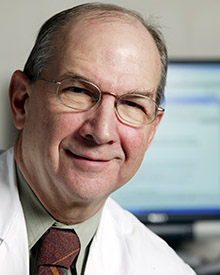
Peter Rabins, M.D., M.P.H.
- Professor Emeritus of Psychiatry, Geriatric Psychiatry
Srinivasa N. Raja, M.D.
- Professor of Anesthesiology and Critical Care Medicine
- Professor of Neurology
- Director of Pain Research, Department of Anesthesiology/CCM
Professional profile: Srinivasa Raja received his residency training in anesthesiology at the University of Washington, Seattle, and postdoctoral research training at the University of Virginia School of Medicine in Charlottesville.
Raja’s research efforts, funded by the National Institutes of Health for 30 years, are aimed at understanding the peripheral and central mechanisms of neuropathic pain and in identifying novel peripheral targets for alleviating pain. He has published more than 200 original articles in peer-reviewed journals. Raja was a member of the editorial board of Anesthesiology (1993–2006) and a section editor for PAIN (2012–14).
Raja served on Food and Drug Administration scientific advisory panels for the Center for Drug Evaluation and Research, scientific program committees for the World Congress on Pain (2008–12) and chaired the committee for the 15th World Congress on Pain in 2014. He was the chair of NeuPSIG, the neuropathic pain special interest group of the International Association for the Study of Pain, and secretary of the International Association for the Study of Pain (2014–16). He was a member of the Federal Pain Research Strategy Steering Committee in 2015, which coordinated research efforts in the field of pain across all U.S. federal funding agencies.
Raja received the Wilbert E. Fordyce Clinical Investigator Award from the American Pain Society (2008) and the prestigious John J. Bonica Award from the American Society of Regional Anesthesia and Pain Medicine (2010).
Personal profile: My wife, an internist and geriatrician, and I have two daughters and two granddaughters. We enjoy tennis, traveling and exploring different cultures, and visiting our grandchildren. My personal hobby is photography (nature and macro), while my wife is an avid gardener.
Academy interests: I am interested in mentoring early career faculty seeking an academic career in clinical or basic research. I would offer my services in providing reviews on grants and manuscripts for submission. I am exploring volunteer opportunities for involvement in education of children, and other community activities to help the less fortunate.
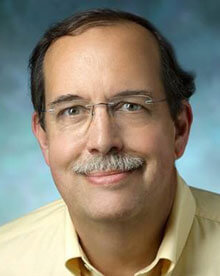
Randall Reed, Ph.D.
-
Professor of Molecular Biology & Genetics
Terence Risby, Ph.D.
- Professor Emeritus of Environmental Health and Engineering
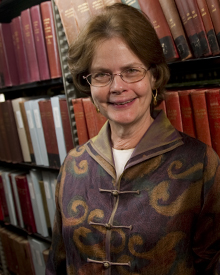
Nancy Roderer, M.L.S.
- Professor Emerita, Health Sciences Information
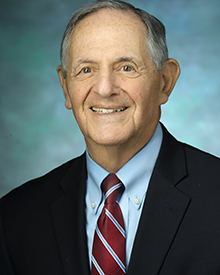
Beryl J. Rosenstein, M.D.
- Professor of Pediatrics
Professional profile: A native of Boston, Beryl Rosenstein received his undergraduate degree from Boston University, medical degree from Tufts University and a master’s degree in administrative science from the Carey Business School. After a pediatric residency at Johns Hopkins, he spent two years as an epidemic intelligence service officer at the Centers for Disease Control and Prevention in Atlanta. He returned to Baltimore in 1966 to join a pediatric group practice and also to work half-time at the Johns Hopkins cystic fibrosis center. In 1982 he became a full-time member of the Johns Hopkins faculty, devoted most of his clinical effort to the cystic fibrosis center and advanced up the academic ladder. Rosenstein has worn many hats at Johns Hopkins, including director of the cystic fibrosis center for 30 years, director of the full-term nursery, director of the pediatric emergency room, and director of a successful pediatric continuing medical education course over the past 35 years. He has held a number of leadership roles, including medical director of Mt. Washington Pediatric Hospital from 1988 to 1983, co-chair of a Johns Hopkins Institutional Review Board over the past 25 years and vice president for medical affairs at the Johns Hopkins Hospital from 1994 to 2009. He has served in a number of leadership roles at the Cystic Fibrosis Foundation including membership on the board of trustees. He is currently chairman of the board of Mt. Washington Pediatric Hospital and for the past 10 years has served on the Maryland Board of Physicians. Rosenstein has received a number of awards, including the Cystic Fibrosis Foundation President’s Award, the Lifetime Achievement Award from the Maryland Chapter of the American Academy of Pediatrics and the Tufts Medical Association Dean’s Award. His bibliography includes three pediatric textbooks and over 200 journal articles and book chapters.
Personal profile: My late wife, Carolyn, a reading specialist at McDonogh School, died in 2012. Our son lives in New York and our daughter in Michigan, and our seven wonderful grandchildren are scattered across the Midwest and East Coast. In 2015 I married Frona Brown, who is on the Goucher College faculty, and inherited an additional 11 grandchildren. We enjoy art, theater, hiking with the Mountain Club of Maryland, spending time with children and grandchildren (seven now in college) and traveling. I have had the pleasure of visiting 76 countries — most recently South Africa and Zimbabwe —and look forward to even more travel adventures.
Academy interests: mentoring, working in the archives and taking part in social activities
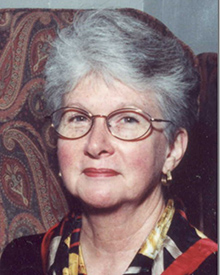
Dorothy L. Rosenthal, M.D.
- Professor Emerita of Pathology/Cytopathology
Professional profile: Dorothy Rosenthal has practiced her entire medical career as an academic cytopathologist. She graduated from the University of Kansas with a bachelor’s degree in 1961 and a medical degree in 1966. She completed her pathology residency at Milwaukee County General Hospital in 1970. Her years as pathology faculty at the University of Wisconsin (1970–72), UCLA (1972–94) and Johns Hopkins (1995–present) formed her passion for her specialty. She has made major contributions to the diagnostic criteria used in cytopathology. A 10-year National Institutes of Health RO1 grant supported the development of automated and computerized screening systems for review of Pap tests. These efforts contributed to the currently available commercial Pap test scanners. For that research, Rosenthal received the UCLA Woman of Science Award in 1989.
Most recently, Rosenthal led international colleagues in defining a paradigm shift for the cytologic diagnosis of bladder cancer, prompting the President’s Award from the American Society of Cytopathology (2016) and the Papanicolaou Society’s Lifetime Achievement Award (2017). She has served as president of the ASC and the International Academy of Cytology and has received from each their highest honors for her contributions to cytopathology. Although officially retired from Johns Hopkins in 2014, she still mentors house staff and young faculty with their clinical research projects. As a featured speaker at professional meetings, she continues her fondness of travel, learning about various cultures from direct interaction with those who host her. Rosenthal is very excited to be a founding member of The Academy.
Personal profile: My husband, Bill Nerenberg, and I have four children and eight grandchildren whom we visit whenever possible. Baltimore has provided us with opportunities to hear all kinds of wonderful music. Our emotional and financial support for the musicians of the Baltimore Symphony Orchestra recently prompted the entire orchestra to play “Happy Birthday to You” to Bill at a rehearsal in Dublin. Musical groups entertain friends in our Towson home, accompanied by succulent examples of Bill’s culinary skills.
Academy interests: mentoring, coaching, teaching, community volunteering
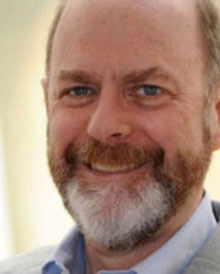
Gary Rosner, Sc.D.
-
Professor of Oncology, Biostatistics & Bioinformatics
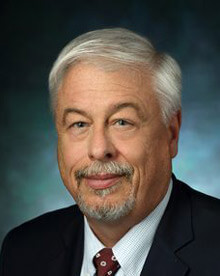
David L. Roth, Ph.D.
- Professor of Geriatric Medicine and Gerontology, Epidemiology, and Biostatistics
Professional Profile: David L. Roth joined the faculty at Johns Hopkins in 2012 to become the third Director of the interdisciplinary Center on Aging and Health. He held this position for over 11 years until June of 2023. Prior to coming to Johns Hopkins, he was a Professor of Biostatistics, Psychology, and Geriatric Medicine at the University of Alabama at Birmingham.
Roth earned his undergraduate degree with majors in mathematics and psychology from the University of North Dakota in 1980. He then earned masters and doctoral degrees in clinical psychology from the University of Kansas, followed by a 1-year internship in clinical neuropsychology at the University of Florida in 1986.
Roth has engaged in a wide variety of federally funded research over his career. This includes major contributions to the literature on family caregiving for older adults with chronic illnesses and disabilities. He has also frequently served as a senior methodological and statistical co-investigator on innovative clinical trials for vulnerable older adults and their family members. In 2021, Roth was awarded the prestigious M. Powell Lawton award from the Gerontological Society of America for his groundbreaking research in applied gerontology.
In addition to his extensive research activities, Roth has also been active in community organizations and leadership positions. He is a former member of the Baltimore Commission on Aging (2013-2021) and was appointed by Governor Larry Hogan to serve on the Maryland Commission on Aging (2018-present).
Personal Profile: I live in Severna Park in a wonderful neighborhood and with a terrific dog (a flat-coated retriever). I enjoy boating, hiking, camping, and other outdoor activities. I have two adult sons and five small grandchildren. One son and his family live in Jacksonville, Florida and the other group lives in Hixson, Tennessee. I am looking forward to visiting them much more often over the next few years.
Academy Interests: I look forward to the Academy’s social activities, attending and coordinating talks, and to participating in community volunteer opportunities.
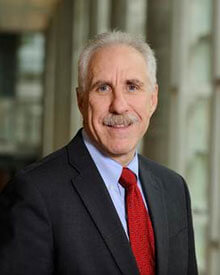
Paul Rothman, M.D.
- Dean Emeritus, School of Medicine
- Professor of Medicine
Donna Rowley, Ph.D.
- Research Associate, Medicine, Hematology
Chester Schmidt, M.D.
- Professor of Psychiatry
- School of Medicine
Lawrence Schramm, Ph.D.
- Professor Emeritus, Biomedical Engineering and Neuroscience
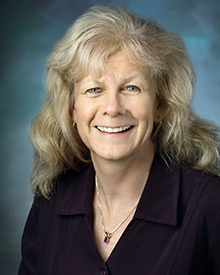
Janet R. Serwint, M.D.
- Professor Emerita of Pediatrics
Professional profile: Janet Serwint joined the Johns Hopkins Division of General Pediatrics and Adolescent Medicine in 1990. As the medical director of the Harriet Lane Clinic, she oversaw the care of low-income patients and the education of pediatric residents. She served as the pediatric residency program director, the vice chair of pediatric education, as a managing board member of the Institute for Excellence in Education (IEE) and a faculty member in the Bloomberg School of Public Health. Serwint has focused her career on the study of health care issues of children in poverty and also resident education, with particular emphasis on communication, humanism, physician well-being and mentoring. In 2002, she developed a national practice-based pediatric research network, CORNET, the Continuity Research Network, and served as its director for 15 years. She was elected to the Society for Pediatric Research and the American Pediatric Society, and served as president of the Academic Pediatric Association. Serwint is also associate editor of In Briefs in Pediatrics in Review, a publication of the American Academy of Pediatrics.
Serwint received multiple teaching and mentoring awards from the Department of Pediatrics and the IEE, the Professor’s Award of Clinical Teaching from the Johns Hopkins University School of Medicine and national awards from the American Academy of Pediatrics, the Academic Pediatric Association and the Association of Pediatric Program Directors.
After graduating from Northwestern University Medical School, Serwint completed her residency training at the Children’s Hospital of Los Angeles and Riley Children’s Hospital in Indianapolis, Indiana, followed by a Robert Wood Johnson fellowship in general academic pediatrics at The Johns Hopkins Hospital. Her bibliography includes more than 150 peer-reviewed manuscripts, narratives, editorials and web-based curriculum.
Personal profile: I am married to Joseph Mihalovich Jr., who worked in information technology as a data architect for many federal projects. I enjoy travel, both in the United States (especially our beautiful national parks) and internationally, hiking, downhill skiing, photography, viewing movies and reading. My current professional focus is on promoting physician well-being and resilience at a national level and continuing with coaching and mentoring across the educational continuum.
Academy interests: mentoring and coaching medical students, residents, fellows and faculty in educational pursuits, research scholarship, career development and teaching skills
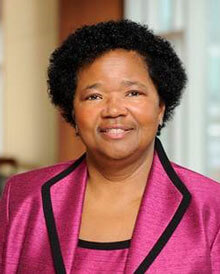
Phyllis Sharps, Ph.D.
- Professor of Nursing, Community Programs
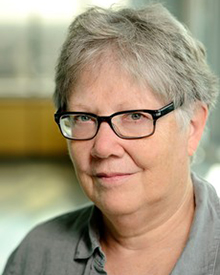
Ellen K. Silbergeld, Ph.D.
- Professor Emerita, Bloomberg School of Public Health
Professional profile: Ellen Silbergeld received her bachelor’s degree from Vassar College in history and, after a pause from higher learning, a Ph.D. in environmental engineering from the Whiting School of Engineering at Johns Hopkins in 1972, along with field training in ecology at Woods Hole Oceanographic Institution. She completed a postdoctoral fellowship at the school of public health before taking a research position at the National Institute of Neurological Diseases and Stroke at the National Institutes of Health in 1975. Following a 10-year position as senior scientist with the Environmental Defense Fund, she returned to academia, first with the University of Maryland Medical School, where she was appointed professor in the Department of Pathology, directed a program in toxicology and later moved to the Department of Epidemiology and Preventive Medicine. In 2002, she returned to Johns Hopkins as professor in the departments of environmental health, epidemiology, and health policy and management. During her academic career, Silbergeld served as an adviser to many state and federal agencies in the U.S., Bermuda, Mongolia, Taiwan, Japan and Brazil, as well as many international institutions, including the World Bank, the Organisation for Economic Co-operation and Development, and many United Nations organizations, including the World Health Organization.
Silbergeld conducted research with colleagues in many of these countries, including leading a Fogarty program for research and training in public health in Mongolia. She has held leadership positions in scientific societies and editorial positions for many journals.
Her research career has been funded by the NIH, the Centers for Disease Control, the Food and Drug Administration, the Environmental Protection Agency and several foundations. She began her research at Johns Hopkins by investigating the mechanisms by which lead exposure affects the neurobehavioral development of young children, for which she was recognized with a lifetime achievement award from the Society of Toxicology, the Barsky Award from the American Public Health Association and a MacArthur Foundation fellowship in 1983. She is an elected member of Phi Beta Kappa and Delta Omega, as well as a member of the Collegium Ramazzini in Bologna. In 2015, she received the Distinguished Alumnus Award from Johns Hopkins. Her bibliography includes more than 400 peer-reviewed journal articles, monographs and book chapters, editorials and a book about chickens in Maryland.
Personal profile: I have two accomplished children: Sophia, who continues her deep involvement in Maryland and Baltimore civic affairs, and Nicholas, who has worked on Wall Street in investment banking, in Panama in rural development and currently for a social investment fund. I grew up in New England as the daughter of two New Englanders, and while I have adapted to life south of the Mason Dixon line, I haven’t acclimated: I still go north to Cape Cod for summers and hope to spend more time there after full retirement. My avocations include both the arts and nature: I attend and support chamber music and the opera and play the harpsichord. I also fly-fish, bird watch and take every advantage to explore the wild places and cultures of all the countries where environmental health has taken me. I am working on a second book about my 20 years’ collaboration in Brazil.
Academy interests: mentoring students and junior faculty; lecturing in courses; and contributing services to the Johns Hopkins University Press
Edward Sills, M.D.
- Professor of Pediatrics
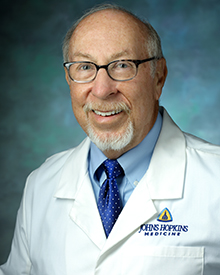
Harvey Singer, M.D.
- Professor of Pediatric Neurology
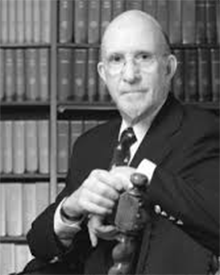
Phillip R. Slavney, M.D.
- Eugene Meyer III Professor Emeritus of Psychiatry and Medicine
Professional profile: After an undergraduate education at the University of Wisconsin-Madison, Phillip Slavney attended the Albert Einstein College of Medicine from 1962 to 1966, and then did a mixed medical internship at Einstein from 1966 to 1967. From 1967 to 1969, he was a Peace Corps staff physician in Recife, Brazil, and then returned to Einstein for a year of neurology residency. From 1970 to 1973, Slavney was a psychiatry resident at the Westchester Division of the New York Hospital, where Paul McHugh was the program director; he then went with McHugh to the University of Oregon Medical School, where he was the residency director of the Department of Psychiatry and Behavioral Sciences and director of the psychiatry inpatient service at the University of Oregon Hospital.
In 1976, he came to Johns Hopkins to join McHugh, who had become director of the Department of Psychiatry and Behavioral Sciences. From 1977 to 1993, Slavney was the residency director in the department and an attending physician on the inpatient services, and from 1993 to 2008, he served on and directed the general hospital psychiatry service, doing consultations on medical and surgical inpatients of The Johns Hopkins Hospital. In 2008, he retired from clinical work and became an emeritus faculty member.
Slavney’s scholarly interests have focused on psychiatric methodology and epistemology, on the clinical interface between psychiatry and other medical specialties, and on “hysteria” — especially on histrionic personality disorder. In pursuit of these interests, he has written a number of papers and five books (two with McHugh) and edited two books.
Personal profile: I met my wife, Jacqueline, who is English, while I was a senior medical student doing a neurology elective in London. She is an accomplished photographer whose work has been featured in local galleries and a national magazine, and for many years she was a docent at the Walters Art Museum.
Academy interests: Teaching medical, nursing and other students, and teaching psychiatry residents

Elizabeth Sloand, Ph.D.
- Professor Emerita of Nursing
Philip Smith, M.D.
- Professor of Medicine

Tom Smith, M.D., F.A.C.P., F.A.S.C.O., F.A.A.H.P.M.
-
Professor of Oncology, Medical Oncology
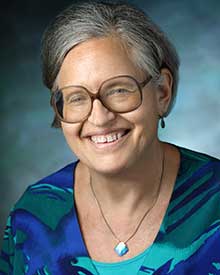
Barbara Sollner-Webb, Ph.D.
-
Professor Emerita, Department of Biological Chemistry, Johns Hopkins University School of Medicine
Professional profile: Barbara Sollner-Webb received her bachelor’s degree in physics from the Massachusetts Institute of Technology, but did her senior thesis in biology with Salvador Luria (the year he won the Nobel Prize). She then earned her doctorate in biological sciences from Stanford University, but did her thesis research at the National Institutes of Health with Gary Felsenfeld (identifying the nucleosome core was her first paper, out of 18 eventually in Gary’s lab). Following a postdoctoral tenure at the Carnegie Institute with Ron Reeder (identifying the first transcriptional initiation and termination sites of an rRNA gene, and eight more papers), she joined the faculty of the Department of Biological Chemistry at the Johns Hopkins University School of Medicine as assistant professor in 1980. She became associate professor in 1984 and full professor in 1988, and remained at Johns Hopkins until retiring emerita in 2014. During those years, she trained more than 50 graduate students and postdoctoral fellows, with whom she published over 100 more scientific papers.
Sollner-Webb’s laboratory research focused on the mechanism of transcription by RNA polymerase I (initiation and termination, mainly studying frog and mouse ribosomal RNA genes) and the processing of the primary rRNA transcript into more mature RNAs (in frog, mouse and human). Her lab also studied a bizarre form of RNA editing involving massive U-insertion and U-deletion in trypanosomes. Additionally, they studied several aspects of subnuclear localization. Sollner-Webb co-organized numerous international scientific meetings, was an editor of several major journals and an active reviewer for many more, and was a member of multiple NIH, National Science Foundation, American Chemical Society, and study sections.
Personal profile: Since retirement, my long-standing environmental and civic interests have expanded to much of my time (e.g, I am active in the governor-appointed Patuxent River Commission, executive boards of my county’s Sierra Club and the Patuxent Riverkeeper, president of the West Laurel Civic Association, and numerous other environmental efforts). I also love trail riding our horses, traveling (with my husband and often with our daughter’s family, who live in Sweden), photography and woodworking.
Academy interests: contributing to social activities, coordinating speakers and talks
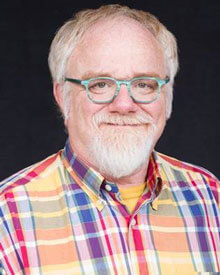
Mark Soloski, Ph.D.
- Professor of Medicine, Rheumatology
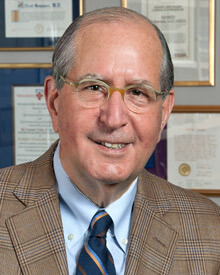
Alfred Sommer, M.D., M.H.S.
- Dean Emeritus, Bloomberg School of Public Health
- University Distinguished Service Professor emeritus
- Professor Epidemiology, Ophthalmology, International Health
Professional Profile: Al Sommer graduated from Union College, Summa Cum Laude, and Harvard Medical School. He did two years of medical internship and residency at the Beth Israel Hospital in Boston, before joining CDC’s Epidemic Intelligence Service. Much of his three years as an EIS officer were spent in East Pakistan/Bangladesh, studying (and implementing control programs) for cholera and smallpox. He then earned his MHS in Epidemiology at Johns Hopkins, and completed his ophthalmology residency at the Wilmer Institute.
Following Wilmer, Sommer and his family moved to Indonesia for 3 years studying clinical, biochemical and epidemiologic aspects of vitamin A deficiency, xerophthalmia, and child mortality. After a year in London at Moorfields Eye Hospital and the Institute of Ophthalmology, he returned to Wilmer to found the Dana Center for Preventive Ophthalmology, a joint undertaking with the School of Public Health. In 1990 he was appointed Dean of the School of Public Health, a position he held for 15 years.
Sommer is a recipient of many awards, including the Lasker Award for Clinical Research; and has received Honorary Degrees from McGill and Johns Hopkins Universities, among others. He is a member of the National Academy of Science and the National Academy of Medicine. He has published over 400 articles and 3 books.
Sommer serves on the Board of Bloomberg Philanthropies and Chairs the Board of Johns Hopkins Medicine International. He has served on the corporate Boards of Becton Dickenson and T. Rowe Price, and chaired the Board of the Albert and Mary Lasker Foundation, among others.
Personal Profile: I’ve been married to Jill Sommer, an elementary school teacher and literacy volunteer, for over 60 years. Our two wonderful children, Charles (former lawyer, web company founder, and now psycho-therapist) and Marni (Professor of Socio-Medical-Sciences at Columbia’s Mailman School of Public Health) reside in Manhattan. We’ve all enjoyed living and traveling to myriad parts of the world with their fascinating histories and cultures.
Academy Interest: Learning new things, and perspectives, from my colleagues.
Ernst Spannhake, Ph.D.
- Professor Emeritus, Department of Environmental Health and Engineering, Johns Hopkins
- Bloomberg School of Public Health
- Chief Science Officer, Global Life Technologies Corp.|Nozin
Professional profile: Ernst W. “Bill” Spannhake completed his undergraduate studies at the University of Florida and earned his doctorate in physiology and biochemistry at the University of Maryland College Park. Spannhake then joined the faculty of the Department of Pharmacology at Tulane University School of Medicine, where he remained for seven years developing his research program in cardiopulmonary and respiratory pharmacology. In 1982, he left Tulane as an associate professor to join the pulmonary and respiratory research group in the Department of Environmental Health Sciences at Johns Hopkins Bloomberg School of Public Health, led by Harold Menkes. There, Spannhake pursued his research interests in the regulatory pathways that mediate the interactions of airway epithelium with airborne chemical and biological agents. He has served as principal investigator on numerous NIH and other grants. In addition to his published work, his academic and educational contributions include mentorship of numerous graduate students and post-doctoral research fellows, decades of classroom teaching, directorship of the environmental health and engineering Master of Health Science program for more than a decade, and his leadership in the development and implementation of two new master’s programs in environmental health.
During his tenure as professor, Spannhake served the department for 10 years as associate chair, sat on many of the school’s standing committees and represented the school for two terms of service on the university’s graduate board. Upon retirement in 2017, he was granted professor emeritus status and continues to advise two doctor of public health students and teach.
Spannhake continues to pursue his interests in the carriage and transmission of pathogenic respiratory bacteria in hospital and other health care settings through his current position as chief science officer for Global Life Technologies, Corp. in Bethesda, Maryland.
Personal profile: My wonderful wife, Elizabeth, and I were married in 1975 and have three sons. Elizabeth is a long-standing orthodontist in local private practice. She is a clinical associate professor of orthodontics at Temple University, teaching and attending in their residency program. We are a long-time skiing family and travel yearly to Colorado during the snow season and in summers to hike, bike and for me to fly-fish. We greatly enjoy international travel and are doing our best to develop that interest within our grandchildren.
Academy interests: Mentoring and advising students, giving occasional lectures, attending special guest lectures and learning about current and emerging issues from university leaders.
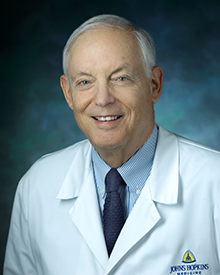
Jerry Spivak, M.D.
- Professor of Medicine, Hematology
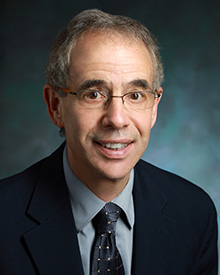
Kerry Stewart, Ed.D.
- Professor of Medicine
Professional profile: Kerry Stewart is professor of medicine at the Johns Hopkins University School of Medicine in the Division of Cardiology and director of Johns Hopkins clinical and research exercise physiology. He is a master fellow of the American Association of Cardiovascular and Pulmonary Rehabilitation (AACVPR), fellow of the American College of Sports Medicine, fellow of the American Heart Association, and a president of AACVPR. He is an exercise physiologist with clinical and research experience in exercise testing and training of persons for the prevention and rehabilitation of chronic diseases including hypertension, coronary disease, diabetes, peripheral arterial disease, arthritis, obesity and cancer, among others.
A native of Brooklyn, New York, Stewart attended Thomas Jefferson High School, Brooklyn College and Columbia University. At Johns Hopkins since 1981, he was a founder of the cardiac rehabilitation program at Johns Hopkins Bayview Medical Center and Johns Hopkins Green Spring. His program investigated new approaches to cardiac rehabilitation, and he performed studies of resistance exercise for cardiac disease treatment and prevention. The use of resistance exercise is now a key component for exercise in health and disease.
He has worked with numerous investigators across many disciplines at The Johns Hopkins University. Most recently, through a Discovery Award, he and faculty in the schools of engineering and arts and sciences examined the effects of acute bouts of exercise on cognitive function.
Stewart also played an important role in promoting exercise training for peripheral vascular disease (PAD). He was the co-chair of the first national symposium on PAD rehabilitation, co-sponsored by AACVPR and the American College of Cardiology in 2002, and more recently, was on the writing committee for the 2016 AHA/ACC Guideline on the Management of Patients with Lower Extremity Peripheral Arterial Disease.
He is presently the Johns Hopkins principal investigator for a Patient-Centered Outcomes Research Institute-funded study of exercise for preventing falls and fractures in older persons. A key focus is change in body composition, particularly bone.
Personal profile: I am married to Cherie Stewart, a retired Baltimore County special education teacher. Our children are Jordan, a foot and ankle surgeon in Timonium, Maryland, and Rebecca, a geographic information scientist in Boston, Massachusetts. We have two fabulous grandchildren in Baltimore: Brennan and Brooklyn. For the past several winters, I have gone skiing with my adult children and grandson in Utah, which is a great intergenerational experience. I try to follow my own professional advice by being in the gym and on the slopes, tennis court and bike trails as much as possible.
Academy interests: academic programming, social events, and mentoring for research
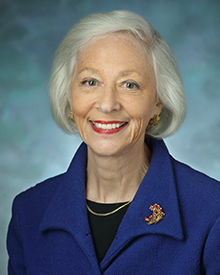
Maxine Stitzer, Ph.D.
- Professor Emerita, Psychiatry, Behavioral Pharmacology Research Unit

Paul T. Strickland, Ph.D.
- Professor Emeritus
- Environmental Health and Engineering
- Bloomberg School of Public Health
- Joint Appointment: Oncology
Professional profile: Paul Strickland received a Ph.D. in Environmental Health Sciences with a focus on Carcinogenesis from New York University. While completing an IARC fellowship at the Paterson Institute for Cancer Research in Manchester, England, he developed the first monoclonal antibody to a DNA-photoproduct.
He has extensive experience in developing, validating and applying assays to assess human exposure to carcinogens and toxic agents. Over the past 30 years, he has worked with epidemiologists to utilize biomarkers of exposure in etiological studies of people with known or suspected exposure to various occupational or environmental toxicants. Dr. Strickland played a fundamental role in developing the field of molecular epidemiology at the Johns Hopkins School of Public Health since joining in 1986. He directed the Division of Occupational and Environmental Health doctoral program in the School of Public Health for 20 years. During this period he advised 21 doctoral students and 10 post-doctoral fellows.
Dr. Strickland sits on the Steering Committee of the National Cancer Institute (NCI) Cancer Epidemiology Training Grant in the Department of Epidemiology, and serves on the advisory board of the CLUE I/II Biorepository. He has also served in an advisory capacity for a variety of organizations including the Environmental Protection Agency, the Department of Energy, the United States Department of Agriculture, the International Agency for Research on Cancer, the National Institute of Environmental Health Sciences Superfund program, UK Ministry of Agriculture, Fisheries and Food, Deployment Toxicology Working Group of the United States Department of Defense, NCI Cooperative on Interdisciplinary Studies of Cancer, and the UK/US Cancer Learning Network. He currently serves on the Scientific Review Panel of the Lymphoma Foundation of America.
Personal profile: I am married to Stacey Wood-Strickland, professor of nursing at Coppin State University, and have two sons, Matthew and Thomas. I enjoy sailing, gardening, wine tasting and therapeutic guitar. (Still working on my bucket list.)
Academy interests: advising/mentoring graduate students, guest lecturing, serving on doctoral exam and defense committees, collaborating with colleagues on research projects
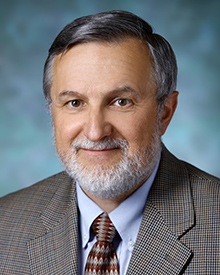
Zsolt Szabo, M.D., Ph.D.
- Professor of Radiology, Nuclear Medicine
Mark Teaford, Ph.D.
- Professor of Functional Anatomy & Evolution
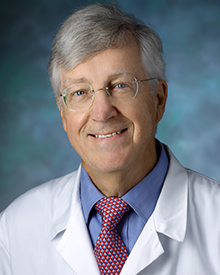
Peter B. Terry, M.D., M.A.
- Professor Emeritus, Medicine
- The Division of Pulmonary and Critical Care, and Sleep Medicine
Professional profile: Peter Terry joined the pulmonary division of Johns Hopkins in 1975. He was interim director of the division on two occasions, and served on multiple divisional, hospital, national and international committees, including the Institutional Review Board at Johns Hopkins, the Professional Assistance Committee of Johns Hopkins, the Johns Hopkins Medical School Admissions Committee, chairman of the Johns Hopkins Hospital Ethics Committee, and the FDA’s Pulmonary Advisory Committee.
His animal and human research focused on pathophysiologic mechanisms of collateral ventilation in the lungs; the development, in conjunction with R. I. White, of the treatment for pulmonary arteriovenous malformations in the lungs; the development, in conjunction with K. P. Wang, of diagnostic techniques in the lung; and later ethical issues surrounding end-of-life decision-making.
He attended Loyola University in Chicago and the Saint Louis University Medical School, and received his training in internal medicine at the University of Connecticut and Johns Hopkins. His pulmonary training was completed at Johns Hopkins and the Mayo Clinic. He received a master’s in philosophy with a concentration in bioethics from Georgetown University. He has written more than 150 journal articles and book chapters.
Personal profile: I am married to Joan Salim, a still-active, 75-year-old health policy analyst for Howard County. We have three children, Michael, Vanessa and Norah. We have a home in British Columbia, Canada, where we spend summers with the children and grandchildren. I enjoy sailing my boat on the Chesapeake Bay when it’s not raining.
Academic interests: teaching fellows and junior faculty, and addressing ethical issues in the medical school
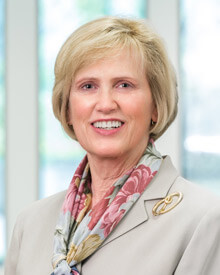
Patricia A. Thomas, M.D.
- Professor of Medicine Emerita
- Department of Medicine, Division of General Internal Medicine, 1988-2014
- Associate Dean for Curriculum, School of Medicine, 2003-2014
Professional Profile: Dr. Thomas served as a general internist and clinician educator in the School of Medicine from 1988-2014. Her educational roles included Firm Faculty Leader and Director of Ambulatory Clinics for the Osler Medicine Housestaff Program, Vice Chair for Education in the Department of Medicine, Ambulatory Medicine Clerkship Director, and Associate Dean for Curriculum in the School of Medicine. She co-led a major reform of the 4-year M.D. curriculum, which was implemented in 2009 as the “Genes to Society” curriculum, emphasizing individualized patient-centered care and systems thinking. Dr. Thomas was a founding member of the team that developed the Masters of Education in Health Professions at Johns Hopkins University, the first degree shared by five schools within the university. In 2014, she was recruited as Vice Dean for Medical Education at Case Western Reserve University School of Medicine, where she served until retirement in 2020.
Dr. Thomas is first editor of the monograph, Curriculum Development in Medical Education: A Six-Step Approach, now in its 4th edition. Her publications have included topics related to clinician-educator faculty roles, health systems science curricula, and health equity in health professions curricula. She continues to work as an accreditation consultant in medical education.
Dr. Thomas received her medical degree from Rutgers Medical School and completed her internal medicine residency at Rutgers Affiliated Hospitals, and rheumatology fellowship at George Washington University School of Medicine. Her teaching awards include election to AOA in 2004 and the Society of General Internal Medicine Career Achievement Award in 2013.
Personal Profile: I currently live in Glen Arm, MD, with my husband of 44 years, Dr. Christopher Bever. Chris is a multiple sclerosis researcher and clinician, Professor of Neurology Emeritus at the University of Maryland, and currently works in administration at the Dept. of VA Office of Research and Development. We have 3 grown children and 6 grandchildren, and love spending time in our second home in Mt. Desert Maine, hiking and kayaking in Acadia.
Academy Interests: Interests include mentoring, coaching, teaching, precepting, and community volunteering.
Mark Tso, M.D.
- Professor of Opthalmology
Amy Tsui, Ph.D.
- Professor of Population, Family and Reproductive Health
Benjamin Tsui, Ph.D., F.A.I.M.B.E., F.I.O.P., F.I.E.E.E.
- Professor of Radiology
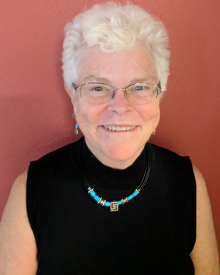
Eileen P.G. “Patti” Vining, M.D.
- Professor of Neurology and Pediatrics (part-time)
Professional profile: After graduating from Johns Hopkins, Patti Vining completed her internship and residency in pediatrics at Children’s Hospital of Pittsburgh, then a fellowship in developmental pediatrics at the John F. Kennedy Institute, now known as the Kennedy Krieger Institute. Her early work was in epilepsy (including EEG training) and cerebral palsy. She eventually focused on epilepsy and became director of pediatric neurology and director of the John M. Freeman Pediatric Epilepsy Center at Johns Hopkins. Her research is in epilepsy and the genetics of epilepsy.
Vining served on numerous committees/boards within the hospital, university and medical school, including medical staff conference committee (president), medical board, administrative committee, contracting committee, school of medicine admissions committee (subcommittee chair), Johns Hopkins University Press faculty advisory board, JHU alumni association executive committee, advisory board of JHU Advanced Studies in Medicine, Johns Hopkins Women’s Medical Alumnae Association (president) and Johns Hopkins Medical and Surgical Association (president).
Outside Johns Hopkins, Vining has been active in the American Academy of Pediatrics (National Conference and Scientific Exhibition Planning Group and Section on Neurology Executive Committee), the American Epilepsy Society (National Meeting Planning Group, Year Round Education Committee, Merritt Putnam Advisory Board) and the Epilepsy Foundation (local and national).
Since “retiring” in 2013, she has remained on the part-time faculty and continues mentoring and serving on committees. She continues some teaching and is working on a new edition of her book. She is the medical school representative to the selection committee of the Society of Scholars. She continues to be committed to the advancement and support of women.
Personal profile: My husband and I enjoy cruises together, recently to the Antarctic. I travel on my own and with wonderful groups, particularly enjoying Greece. We have a remarkable son, who is ABD (all but dissertation) in quantum computing and also interested in the humanities. I’ve joined book clubs and a classics study group — reading Greek and Latin works (in English) — and I’m reveling in new knowledge. I now cook, garden, take courses and “play” at golf.
Academy interests: I’m interested in mentoring, community and possibly professional volunteering, and social activities (especially keeping members aware of the remarkable local and regional opportunities and activities).
Elizabeth Wagner, Ph.D.
- School of Medicine
- Professor of Medicine, Division of Pulmonary and Critical Care
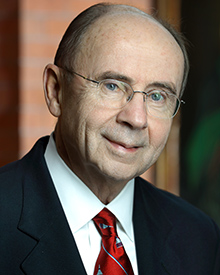
Patrick C. Walsh, M.D.
- University Distinguished Service Professor of Urology Emeritus
Professional profile: Patrick C. Walsh received his undergraduate and medical training at Case Western Reserve University. After an internship and junior residency in surgery at the Peter Bent Brigham Hospital in Boston, he conducted an assistant residency in pediatric surgery at The Children’s Hospital Medical Center in Boston, and a residency in urology as well as a fellowship in endocrinology at the University of California Los Angeles, School of Medicine. He joined the faculty of Johns Hopkins in 1974.
Walsh is best known for his pioneering work in the development of “the anatomic approach to radical prostatectomy.” He is a member of the National Academy of Medicine, served 15 years on the editorial board of the New England Journal of Medicine, in 1996 received the Charles F. Kettering Medal from the General Motors Cancer Research Foundation for “the most outstanding recent contributions to the diagnosis and treatment of cancer,” and in 2007 received the King Faisal International Prize for Medicine for his contributions to prostate cancer.
Personal profile: I married Margaret Campbell Walsh, ASID, a talented interior designer, in 1964 and we have three sons and 10 grandchildren. We are still actively involved with our careers and our religious affiliations.
Academy interests: teaching medical students, following the 4,569 patients who I operated on, and the genetics of prostate cancer
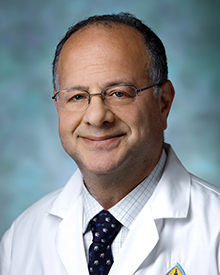
Gary Wand, M.D.
- Professor of Medicine, Endocrine, Diabetes and Metabolism
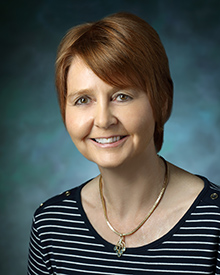
Julie Watson, M.A., VetMB, Dipl. ACLAM
- Associate Professor, Molecular and Comparative Pathobiology (part-time)
Professional profile: Julie Watson graduated from the University of Cambridge, United Kingdom, veterinary school thinking she would practice equine medicine. However, after practicing in the U.K. for a few years, she moved to the U.S. and completed a postdoctoral fellowship at Johns Hopkins, leading to board certification in laboratory animal medicine. She then worked at several academic and government institutions before returning to Johns Hopkins to build the program that supports rodent research, and later restructured and directed the clinical training program for veterinarians who are pursuing board certification in laboratory animal medicine. Although she wasn’t trained as a researcher, she was promoted as a program builder based on her research on environmental factors that impact research results. More recently, Watson has written a regular blog for laboratory animal professionals. In January 2019, she retired after 17 years at The Johns Hopkins University, but currently works one day a week managing infection outbreaks in the university’s colonies of approximately 50,000 mouse cages.
Personal profile: I have an interesting family: I am British, my husband was born in Peru, and I have two grown children who we adopted from China. I don’t have a hobby, I have an obsession called trying to master the classical guitar. I have been studying privately with a Peabody teacher for five years, I play in the Baltimore Classical Guitar Society guitar orchestra and I just started music theory classes at Towson University. For light relief I have a labradoodle puppy that I will be training to participate in the Johns Hopkins University therapy dog program when she’s old enough. This coming summer I expect to be participating in a few adventures in my husband’s recently purchased 36-foot Hunter sailboat, but not too many as I get seasick. The only real travel wish I have is to see the aurora borealis.
Academy interests: I am currently on the social activities committee and happy to have company going to classical guitar concerts.
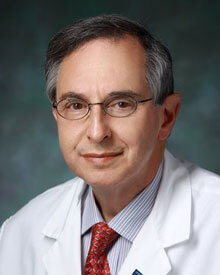
James Lloyd Weiss, M.D.
- Professor of Medicine, Cardiology
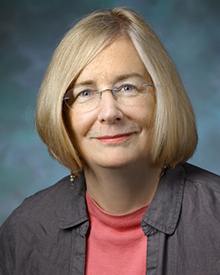
Sheila West, Ph.D., Pharm.D.
- Professor of Opthalmology
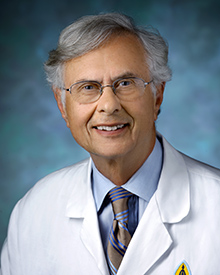
Myron L. Weisfeldt, M.D.
- Professor of Medicine
Professional profile: Myron Weisfeldt was the Osler Professor and Chair of the Department of Medicine at Johns Hopkins from 2011 to 2014. Currently, he volunteers as medical consultant for Johns Hopkins Technology Ventures. He received his medical degree from Johns Hopkins and trained in cardiology at Massachusetts General Hospital and the National Institutes of Health. From 1975 to 1991, he was director of cardiology at Johns Hopkins, and from 1991 to 2001 he was chair of the Department of Medicine at Columbia University College of Physicians and Surgeons. Weisfeldt was president of the American Heart Association in 1990 and is a member of the National Academy of Medicine.
His research interests have included heart function, age changes in the heart and circulation, and cardiopulmonary resuscitation. He led the effort of the American Heart Association to develop and test automatic external defibrillators for bystander use. From 2003 to 2019, he was study chair for a National Heart, Lung, and Blood Institute-sponsored international network to conduct randomized trials of devices, drugs and other therapies for out-of-hospital cardiac arrest and severe traumatic injury. He is proud to soon receive the Dean’s Mentoring Award.
Personal profile: I have been married to Linda Weisfeldt since my senior year in medical school. She has two graduate degrees from Johns Hopkins and a bachelor’s degree from Northwestern. She taught American history and was a library media specialist for most of her career. We have three daughters and six grandchildren. Two have entered college, one at Johns Hopkins and one at Elon University. We enjoy our summer home in Bethany Beach, traveling by bike or ship, and family get-togethers.
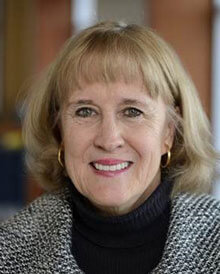
Kathleen White, Ph.D.
- Professor of Nursing
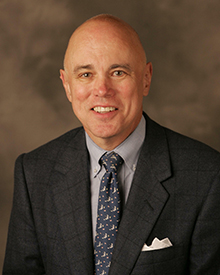
Charles Pat Wilkinson, M.D.
- Professor of Ophthalmology
Frank Witter, M.D.
- Professor Gynecology and Obstetrics
- School of Medicine
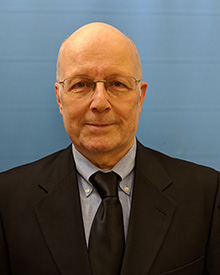
Jerry M. Wright, Ph.D.
- Research Faculty, Department of Physiology, School of Medicine
Professional profile: Jerry Wright led implementation of bioinformatics and systems biology research in an established laboratory with over 20 years of National Institutes of Health funding. He managed the research development cores for the Johns Hopkins physiology department and the Cystic Fibrosis Foundation. Trained in electronics in the military, he earned subsequent degrees in biological sciences, with postdoctoral work in physiology and pharmacology. Wright performed single-channel, patch-clamp research at Cornell and NIH before joining Johns Hopkins in 1997. In 2000, he took the lead in bringing new technology of microarrays into the research group, which subsequently extended to systems biology-oriented analysis of large datasets.
As a result of working with large data sets, Wright became proficient in knowledge management to capture, archive and share laboratory organizational knowledge for efficient continuation of projects in small laboratories. He was an invited speaker at the Knowledge Management in Translation Medicine conference and served as chairman of the scientific committee to integrate expert clinical and basic science knowledge into a disease-specific database. He was invited to speak on laboratory information management systems and electronic laboratory notebooks at the Mid-Atlantic conference of directors and staff of scientific cores.
Wright has extensive experience in integrating computers with instrumentation and analysis in biological laboratories, starting in 1984. He performed computer infrastructure design and implementation for experimental data acquisition, access and assessment. This involved all aspects: integrating data acquisition with instrumentation, data storage and transfer, choice of analytical platforms, archiving data and analysis results, setting up servers to facilitate communication among members of a research group and coordinating internal IT needs with corporate services. He currently continues his information technology role with volunteer work.
Personal profile: I am currently active as 1) a volunteer emergency medical technician, 2) a domain and system IT administrator for the Arbutus Volunteer Fire Department, and 3) maintenance supervisor of 42 miles of the Appalachian Trail in Maryland and Pennsylvania. I am working on IT industry certifications.
Academy interests: evaluating and planning technology in new research
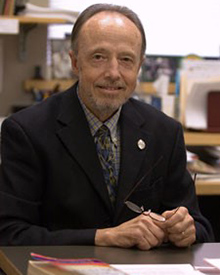
James D. Yager, Ph.D.
- Professor Emeritus (retired)
- Edyth H. Schoenrich Professor of Preventive Medicine, Emeritus
- Department of Environmental Health & Engineering
- Bloomberg School of Public Health
Professional profile: James Yager came to Johns Hopkins from Dartmouth in 1989 as director of toxicology in the Department of Environmental Health Sciences. He was deputy chair of the department from 2013 to 2019.
Yager was the senior associate dean for academic affairs of the Johns Hopkins Bloomberg School of Public Health from 2000 to 2013. In that position, he was responsible for overseeing, facilitating and coordinating existing academic, training and continuing education programs in the school as well as developing new programs.
In 2006, Yager was honored by being appointed the Edyth H. Schoenrich Professor of Preventive Medicine (2006–2017), and in 2010 he was awarded the Ernest L. Stebbins Faculty Award in recognition of exceptional contributions to the development of educational programs throughout the school.
Yager has been actively engaged with Association of Schools of Public Health, now the Association of Schools and Programs of Public Health. He is a member of the National Board of Public Health Examiners (NBPHE) board of directors, is a member of the job task analysis committee and chairs the NBPHE testing committee.
Yager is an expert on the mechanisms of estrogen carcinogenesis, focused on investigating pathways and mechanisms by which endogenous and environmental estrogens contribute to the development of “spontaneous” breast cancer with the goal of developing strategies for assessing genetic and environmental risk factors as targets for prevention.
Personal profile: I am married to Joanne Zurlo, Ph.D. Together we have two children, Chris, who lives in Colorado Springs, and Allison Uzupus, an outpatient oncology nurse at Johns Hopkins. I also have another son, Nick, who lives in Lebanon, New Hampshire, and owns a Mexican restaurant, Gusanos. Joanne and I love to travel and cruise — we have cruised to Alaska, through the Panama Canal, around South America and around New Zealand to Australia. Our main hobbies include sailing and kayaking.
Academy interests: My interests include mentoring students and faculty and participating in Academy-sponsored events.

Sarah Ying, M.D.
- Former Faculty of Neurology/Radiology, Neuroradiology
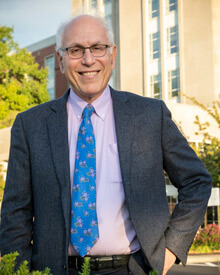
Jonathan Zenilman, M.D.
- Professor of Medicine, Infectious Diseases
Professional profile: My original interest was pathology. As a medical resident at Kings County Hospital (Brooklyn) in 1981-84, I witnessed the emergence of AIDS, and got interested in infectious diseases. I went to CDC from 1985-89 (as an EIS officer and then full time staff), where I was assigned to the STD Division and finished my fellowship at Emory. I here in 1989. At Hopkins, I’ve run the Baltimore STD clinics, taught extensively at Public Health, and had research projects in STD epidemiology, behavioral science, diagnostic test evaluations and clinical trials, and was president of the American STD Association. From 2003-2019 I moved to Bayview, where I was ID Division Chief. There I established robust hospital epidemiology and antibiotic stewardship programs including allergy assessment, developed collaborations with the Burn Center and Geriatrics, and ran an NIH funded Phase I Clinical Trials Unit, got interested in vaccine safety and built the Division from 1.5 to 11 faculty. In late 2019 I stepped down anticipating to rest a bit. Then the pandemic started. In April, 2020, I was asked by Pfizer to chair the independent safety committee for the COVD vaccine program, and subsequently, for the Paxlovid program. These experiences were “the ride of a lifetime”. Currently, I see patients 1-2 clinics/week and serve on the IRB, and continue the DMC work, and am a masters’ student in Hisotry of Medicine. Fun Facts—STDs got me onto the Jon Stewart show, and our Baltimore STD work was highlighted in Gladwell’s The Tipping Point
Personal profile: I’ve been married to Carol for 42 years, and have 3 children, all married, and 2 grandsons. One grandson (age 2) is in Baltimore, and we are backup child care! After many years, I restarted violin lessons, and love Bach and klezmer and we are active with Baltimore Symphony Orchkids and the Creative Alliance. I love to swim and bike, and travel, with Vietnam as my favorite. Carol and I were in Barcelona in October, and are going to Costa Rica late this month.
Academy interests: The highlight of my career has been mentoring and still guide my former students. I also enjoy working with community folks and precepting in the community. I’ve worked with community groups in Baltimore my entire career
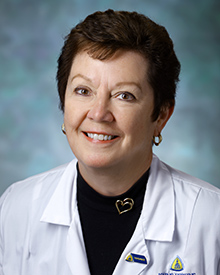
Carol M. Ziminski, M.D., F.A.C.P.
- Associate Professor of Medicine, Division of Rheumatology
- Core Faculty, Vivien Thomas College
- Colleges Advisory Program
Professional profile: Carol Ziminski was the elder of two children, and was raised on Long Island, New York. Her nomination as Matthew Vassar Scholar directed her to Vassar College, from which she graduated summa cum laude with a major in chemistry. She first came to Baltimore as a graduate student in biochemistry at Johns Hopkins, but her life’s purpose and direction unexpectedly and dramatically changed as she audited medical school courses. She completed medical school at Yale University. Ziminski returned to Johns Hopkins as an intern on the Osler medical service, completed her Osler residency, and then became a rheumatology fellow at Johns Hopkins. Her performance on the Osler Medical Service led Victor McKusick to choose her as assistant chief of service — the first female to hold that position in the Department of Medicine — in 1981. She joined the faculty in the Department of Medicine, Division of Rheumatology, in 1982, and has continued her career at Johns Hopkins, dedicated to clinical care and education.
As a clinician educator and leader in the teaching programs of the Johns Hopkins rheumatology division, Ziminski’s scholarly endeavors strongly focused on teaching activities and on the continued development of new educational programs. The American College of Rheumatology Research and Education Foundation recognized her efforts with the Clinician Scholar Educator Award in 2007–2009. She has inspired medical students, residents and fellows by modeling excellence, inquisitiveness, professionalism, tradition and “aequanimitas.”
In 2008, Ziminski was elected as core faculty within the Vivien Thomas College for the Colleges Advisory Program in the school of medicine. She was a member of the Barker Firm during her Osler residency and as assistant chief of service. Since 2009 she has been faculty within the Janeway Firm.
“The practice of medicine is an art, based on science.” –Sir William Osler
Personal profile: I share my passion to build a better world with my wonderful husband, Terence “Terry” Almon. Following our marriage in 1986, we very much enjoyed living in Lutherville. As we were retiring from full-time work, we moved to our new home just over the Chesapeake Bay bridge on Kent Island, at the headwaters of Macum Creek. We have over the years enjoyed having students to our home for a home-cooked meal (with terrific doggie bags, I must admit). We enjoy traveling, the symphony, reading (now that we have time!), cooking, entertaining, gardening — and each other!
Academy interests: mentoring medical students; teaching/precepting medical students, residents and rheumatology fellows; coordinating speakers and talks; and social activities
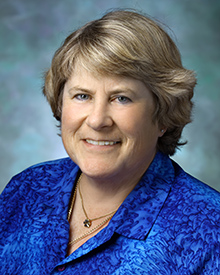
Chris Zink, D.V.M., Ph.D.
- Professor of Molecular and Comparative Pathobiology

